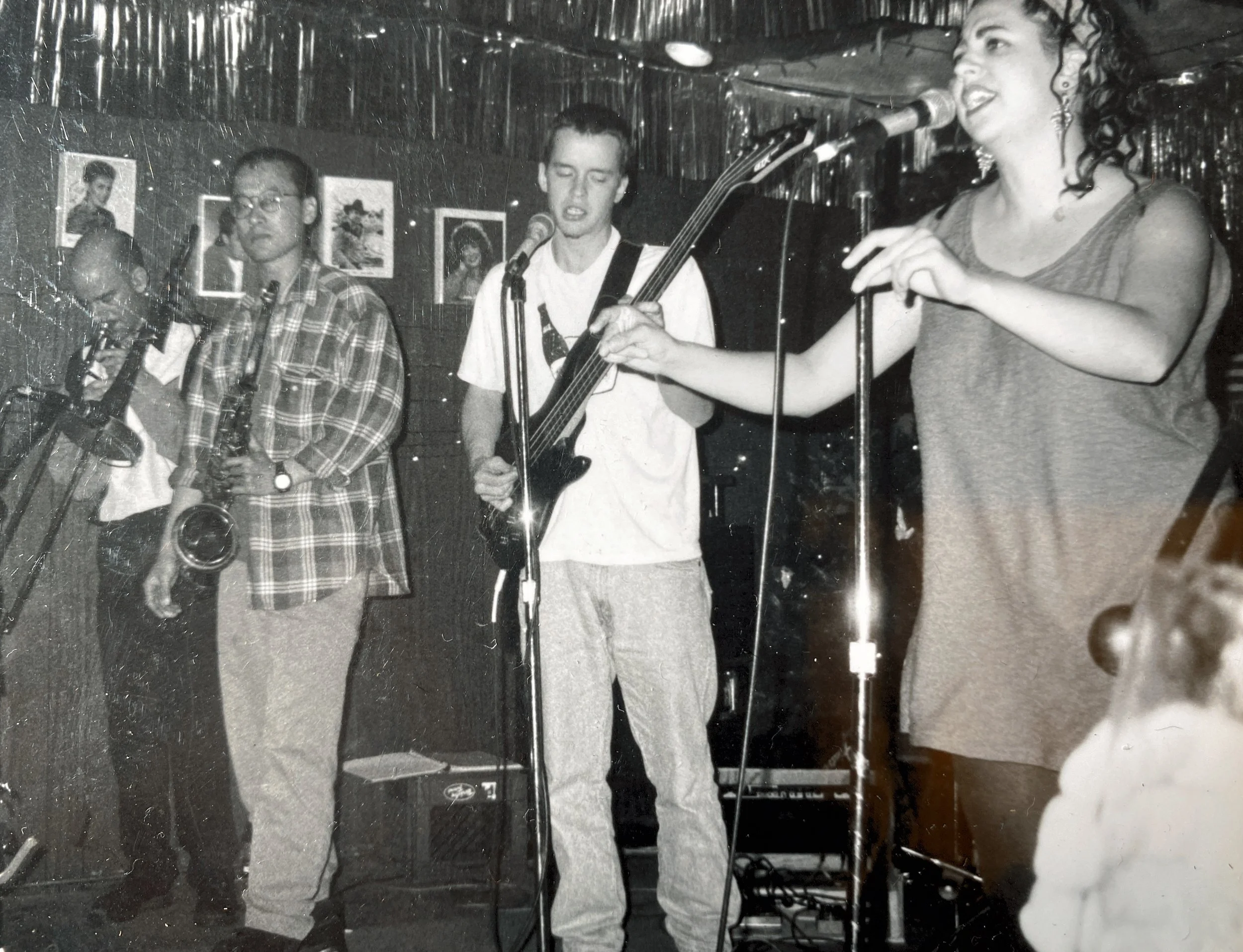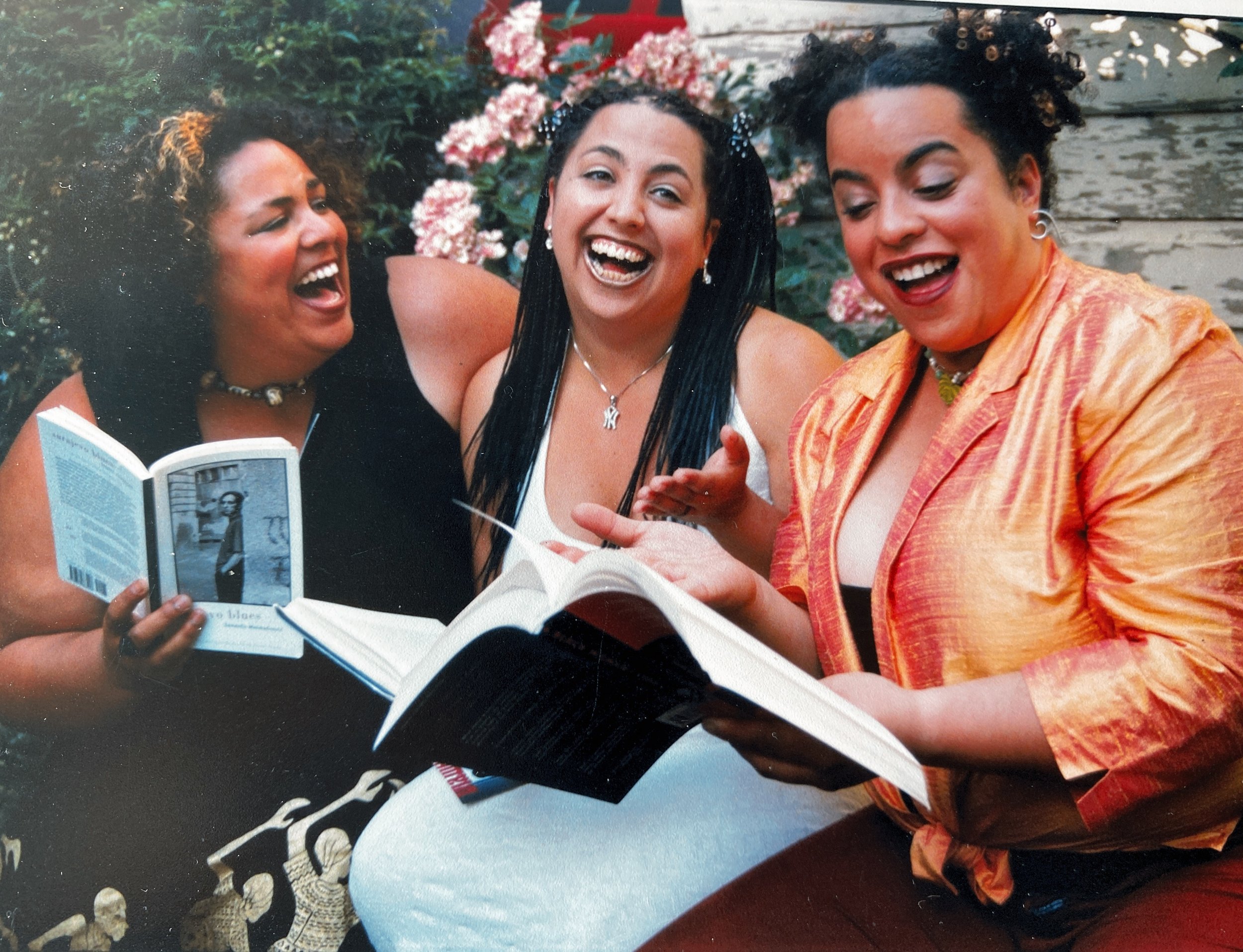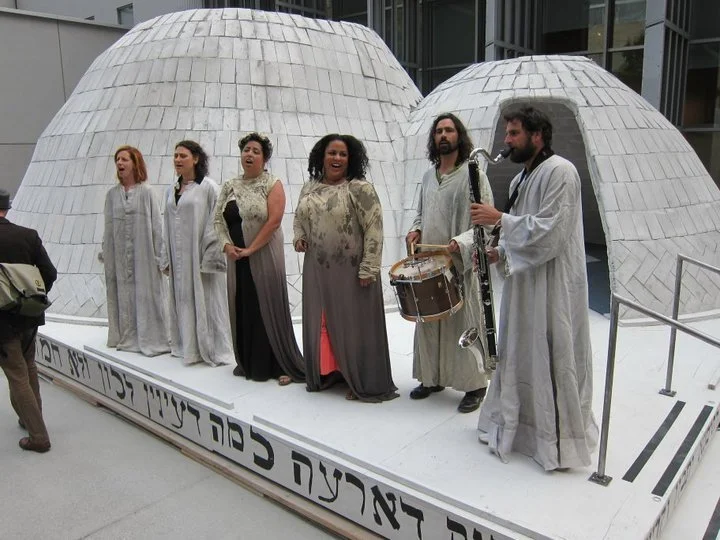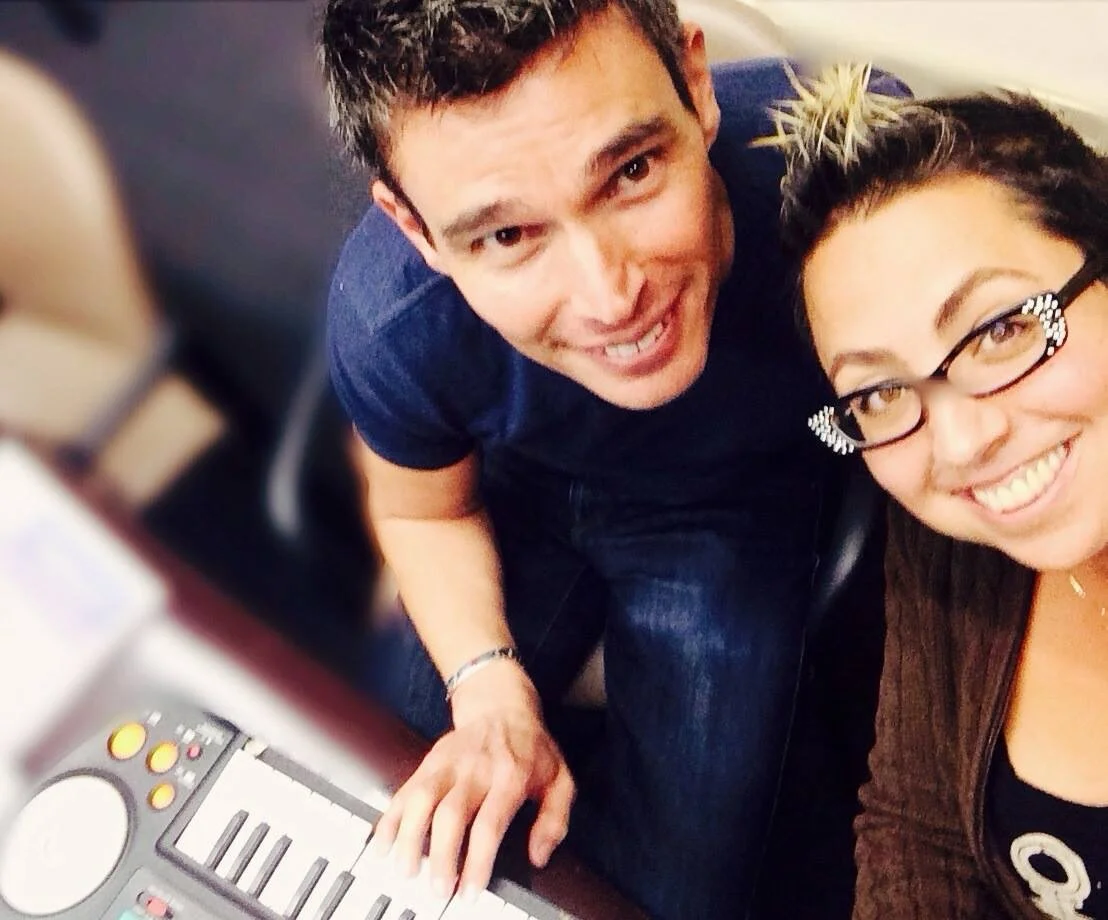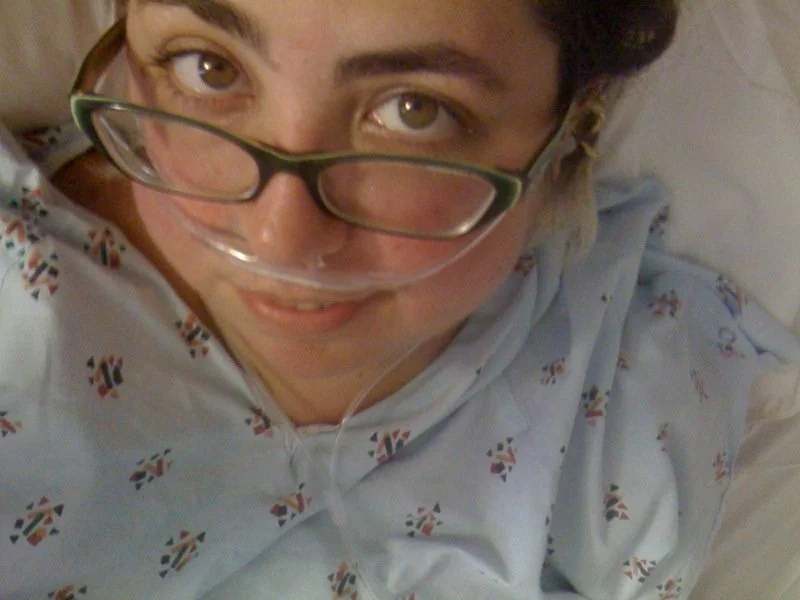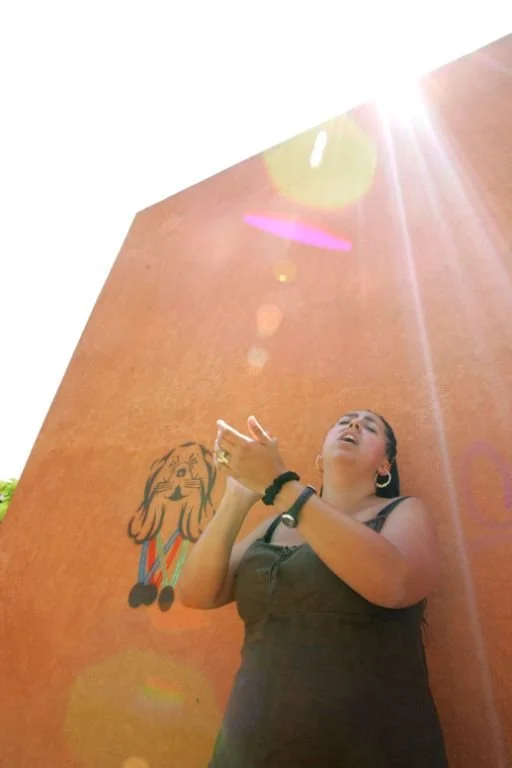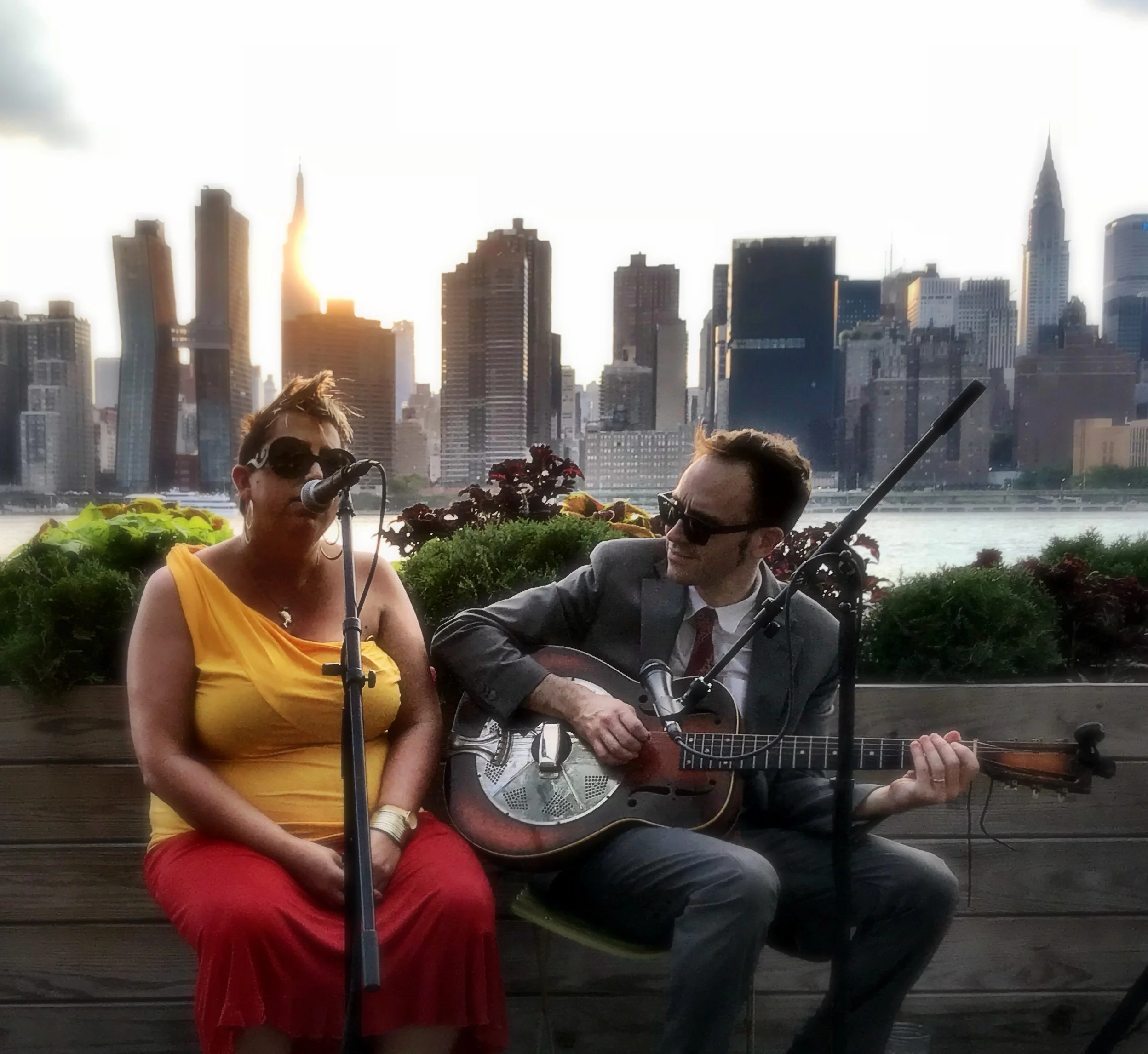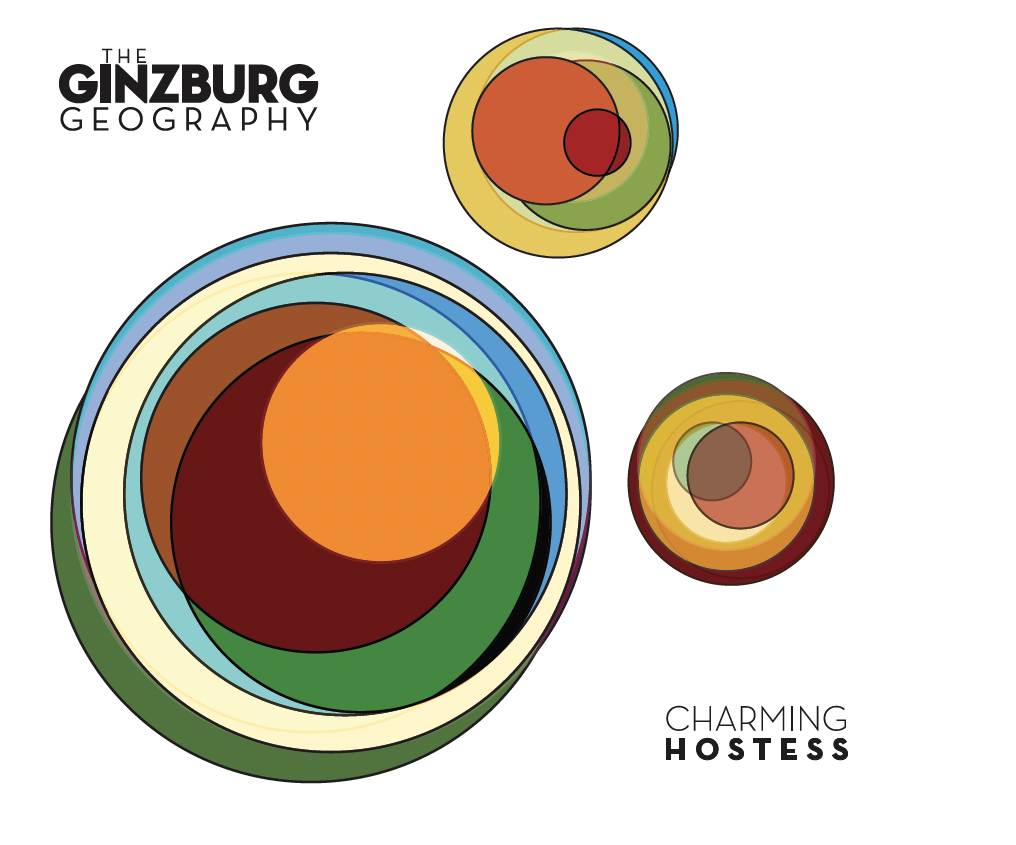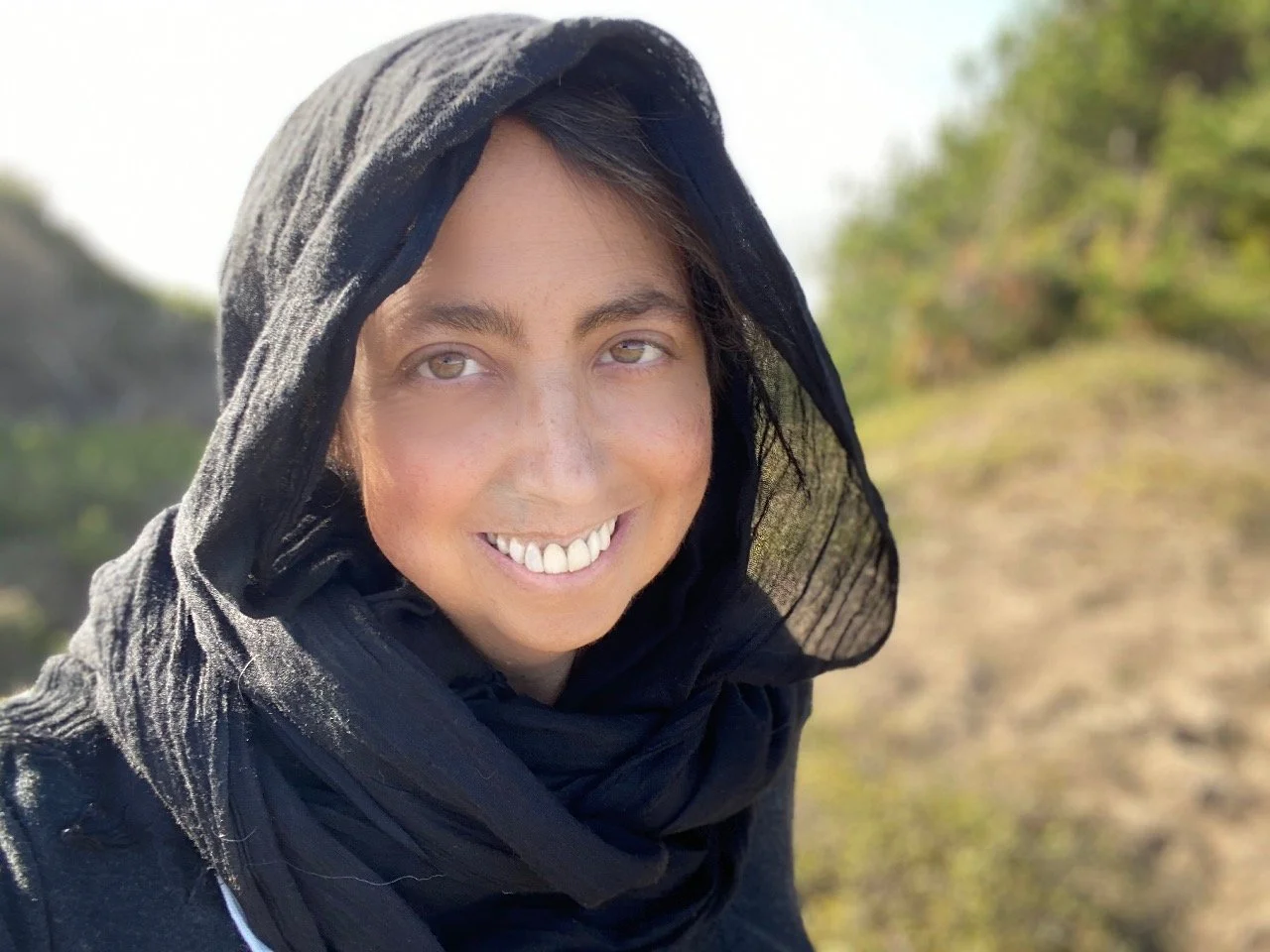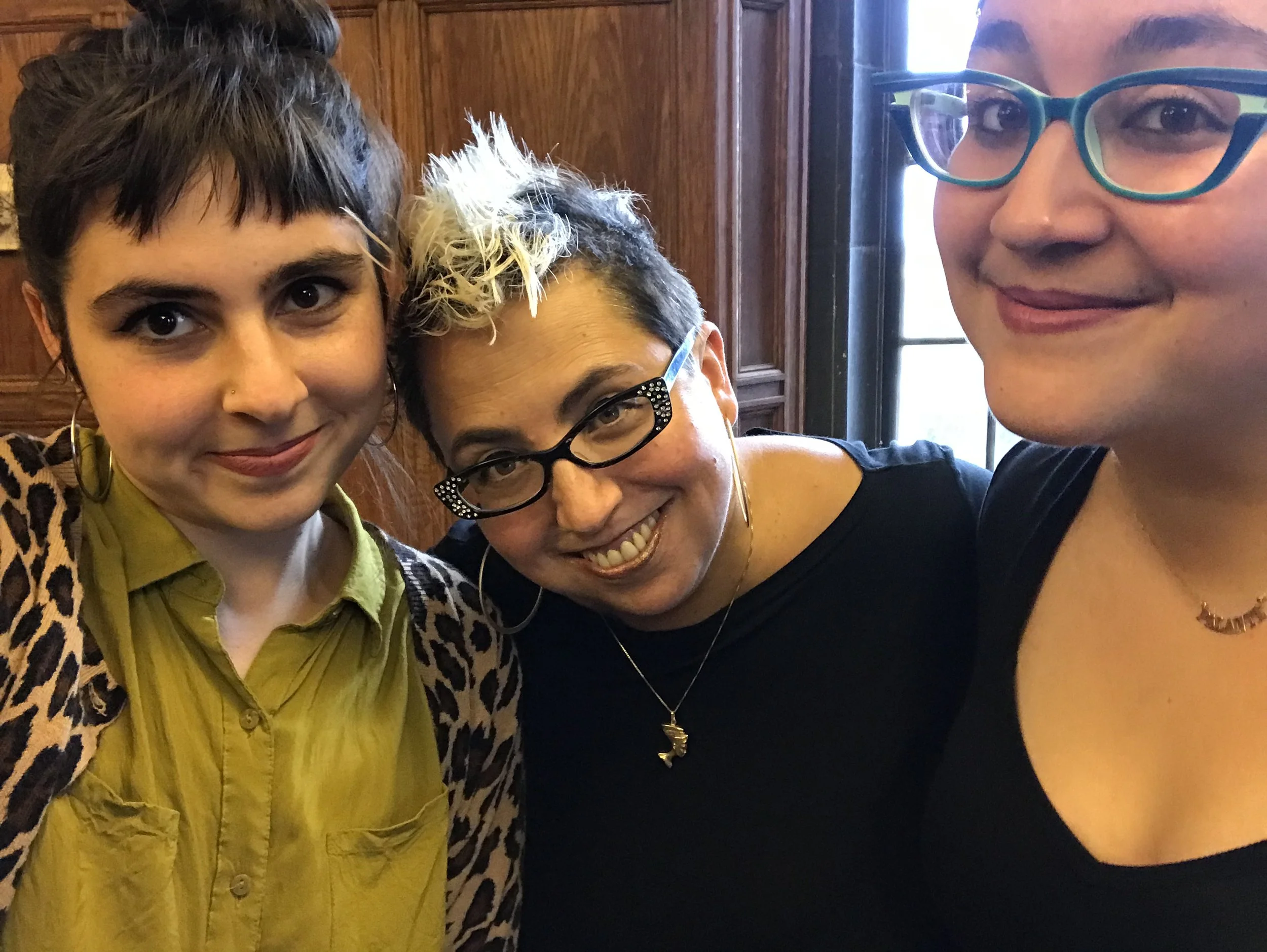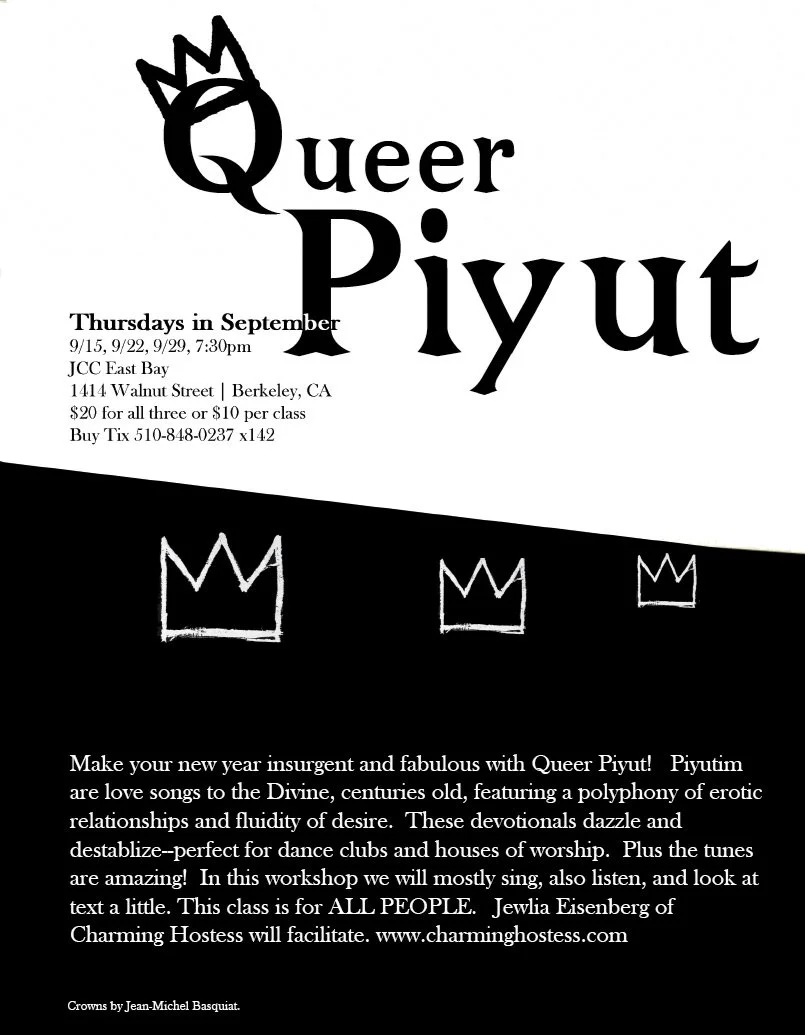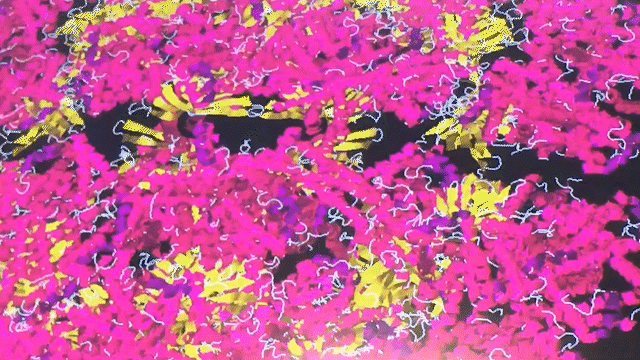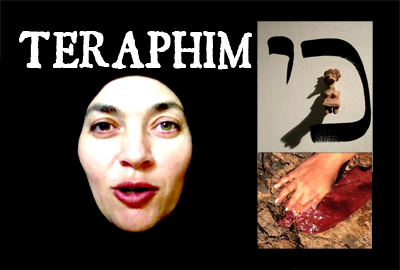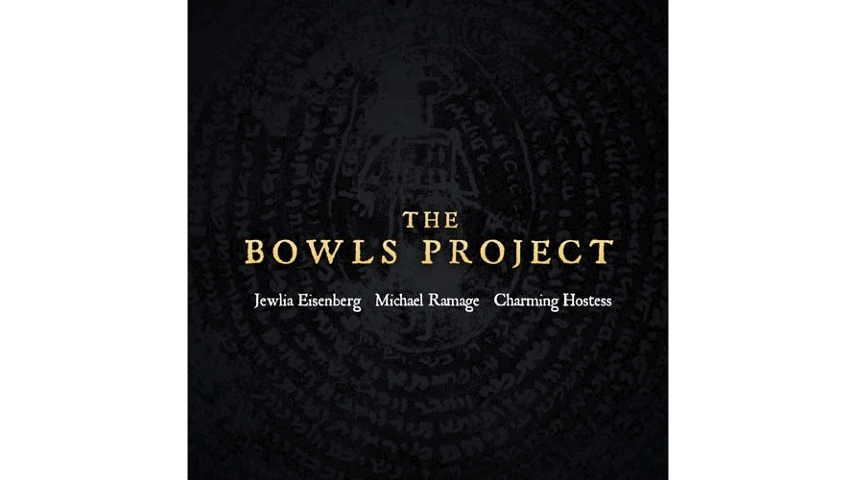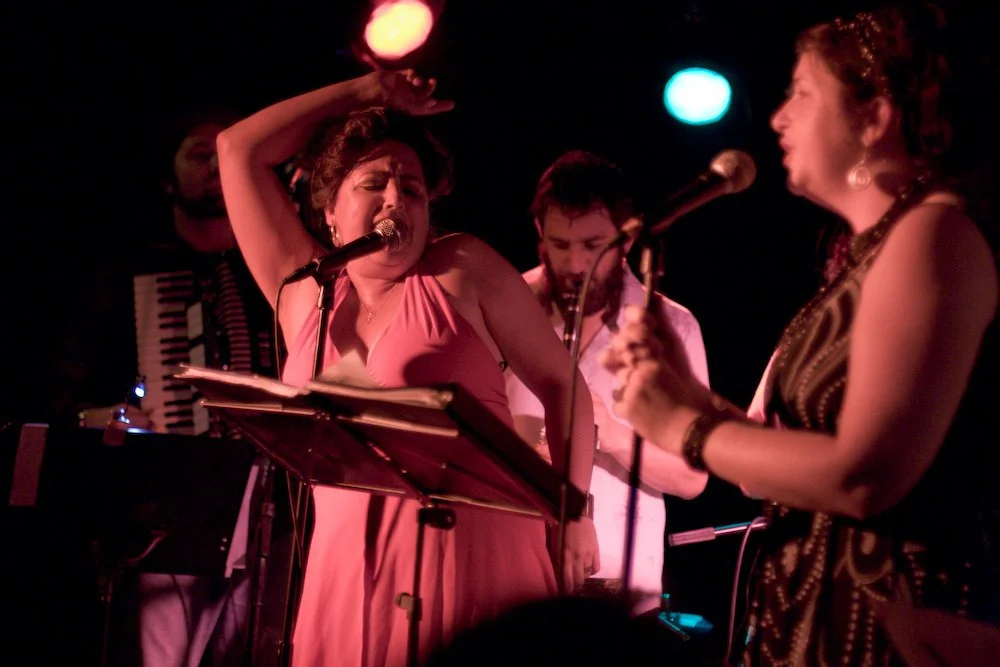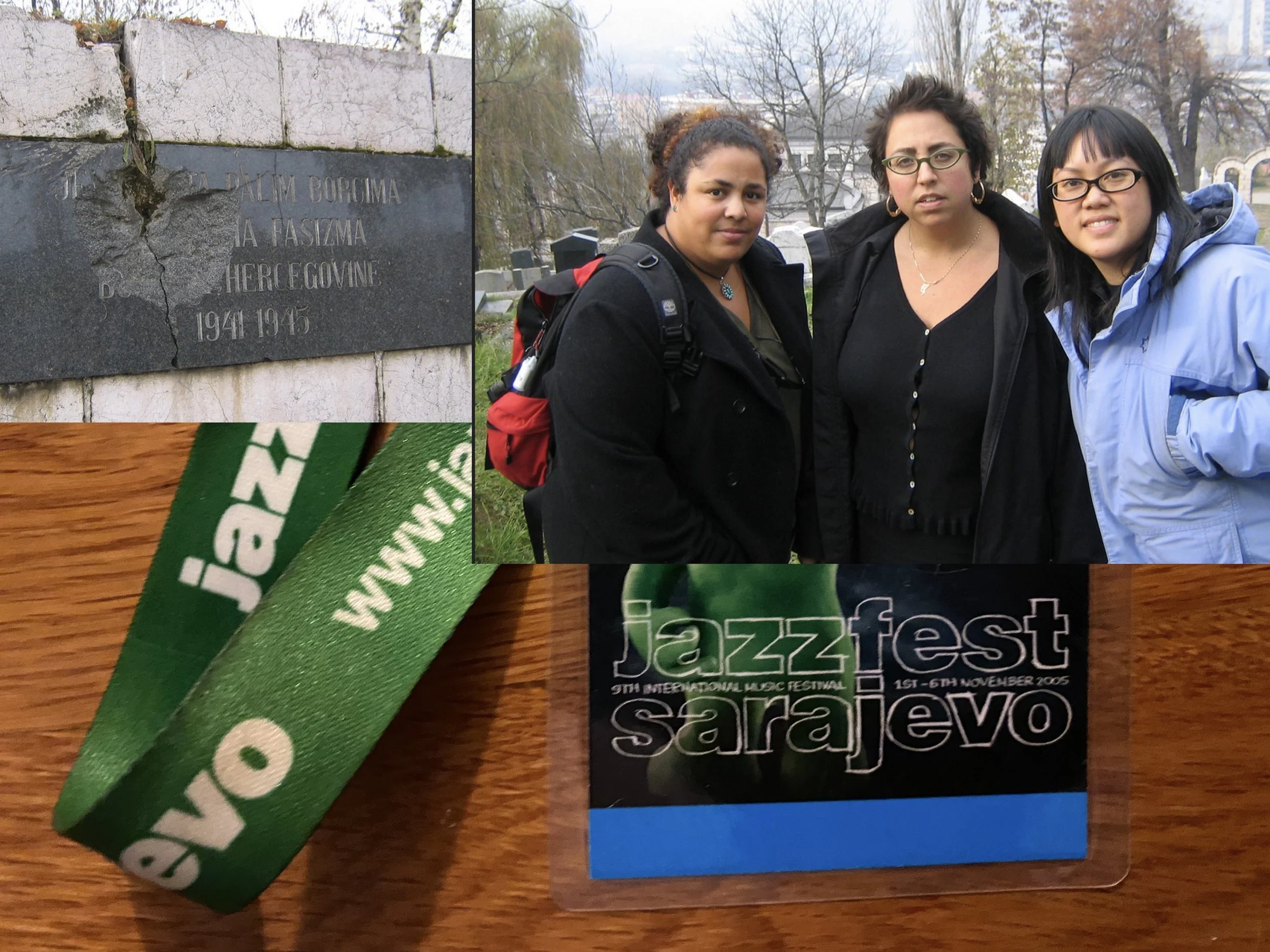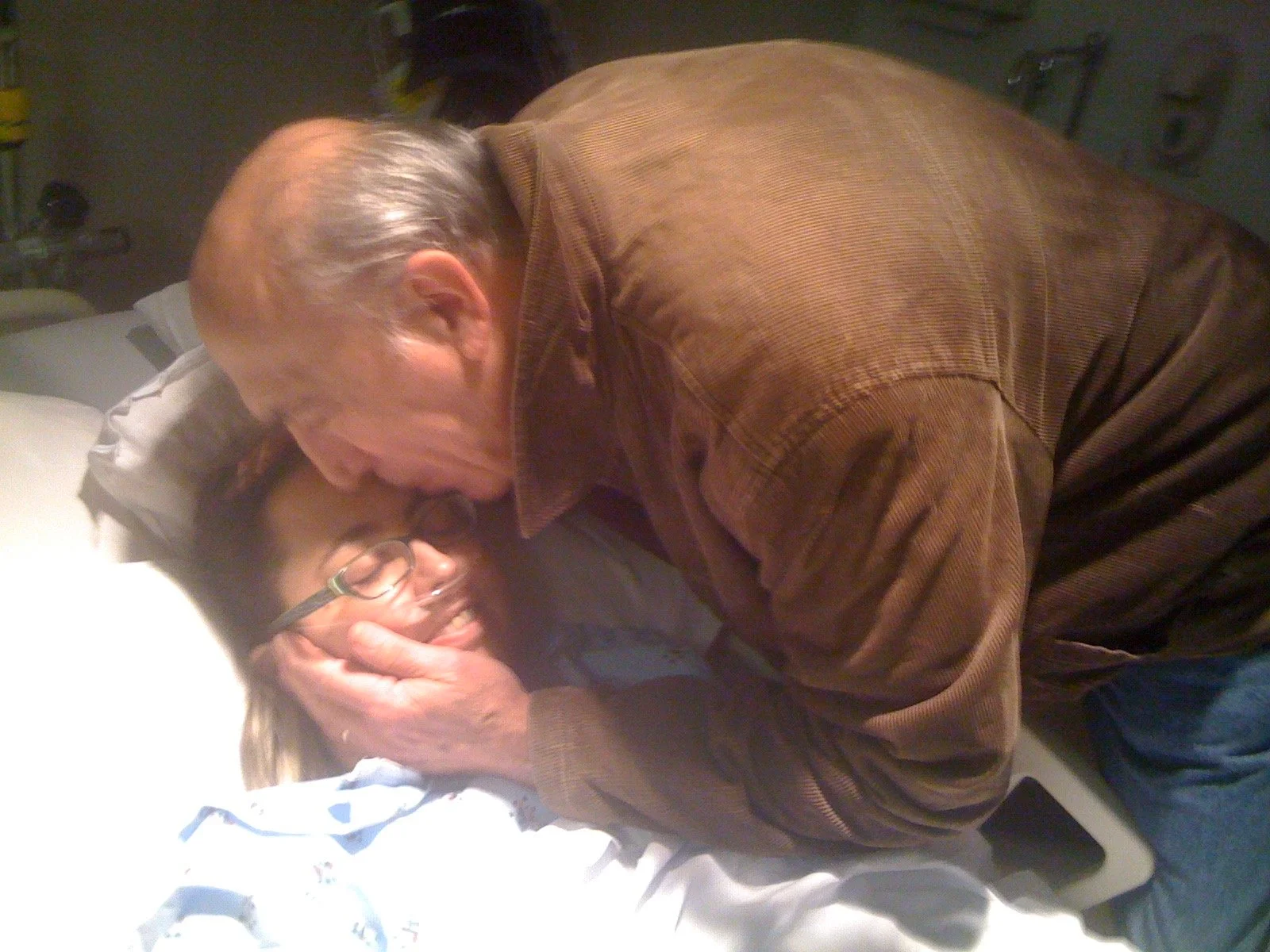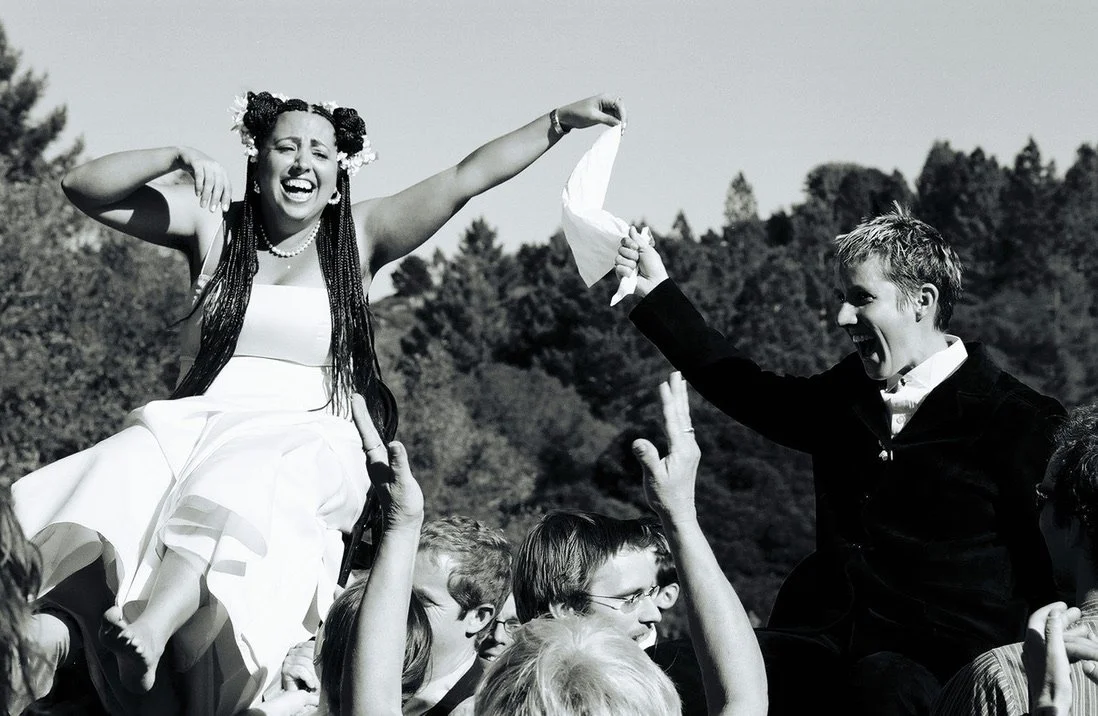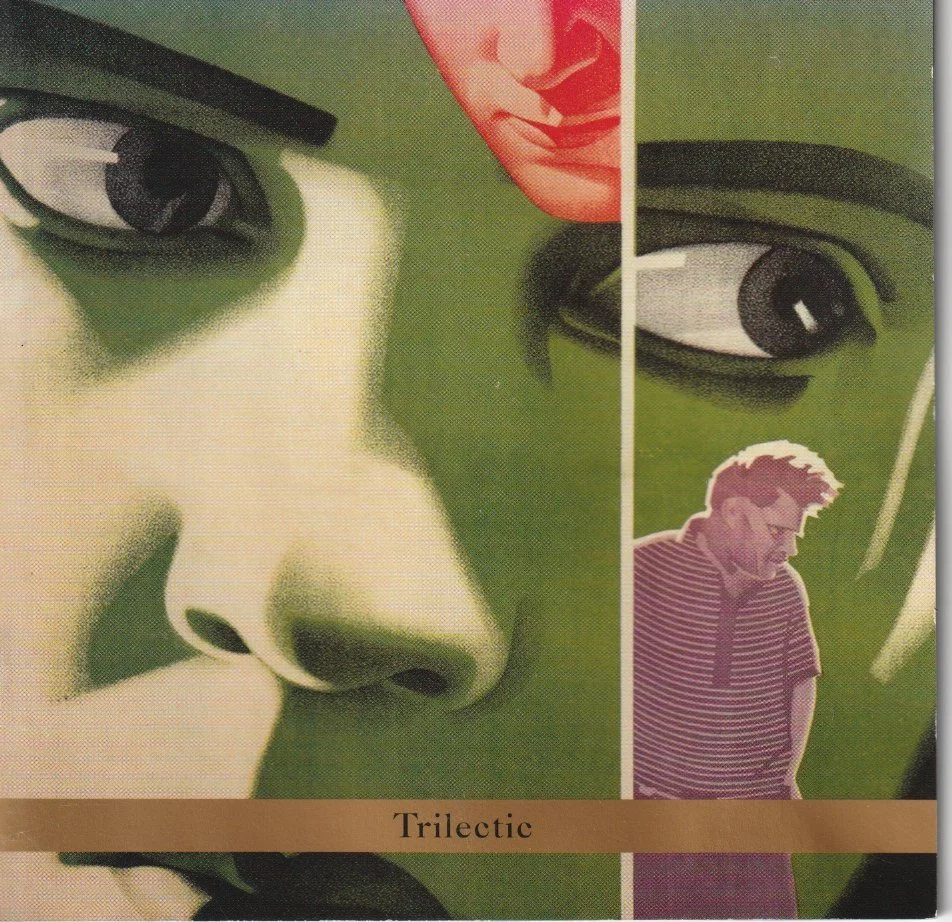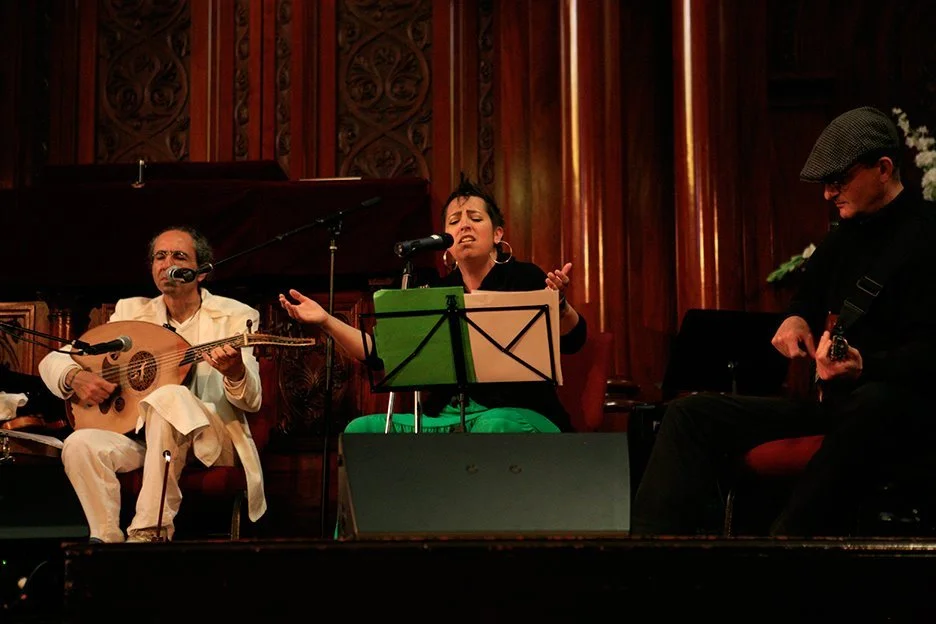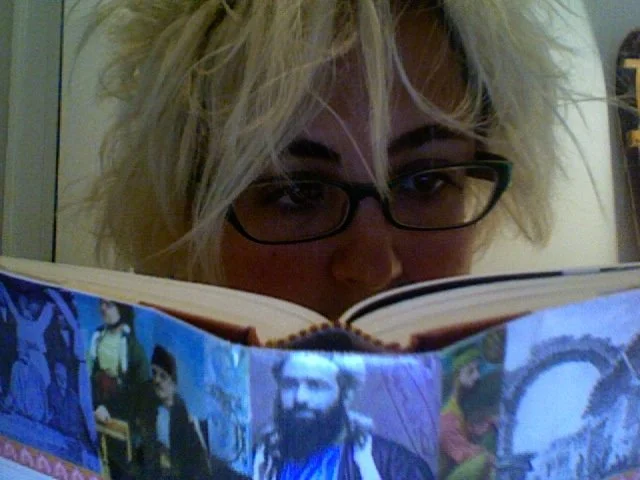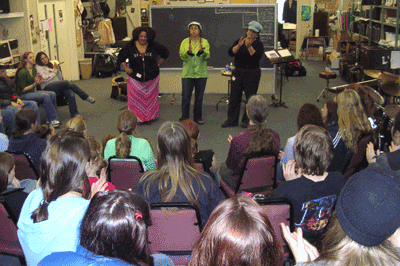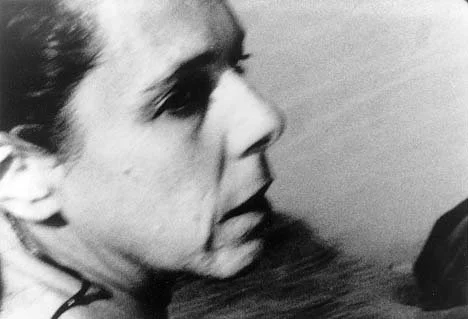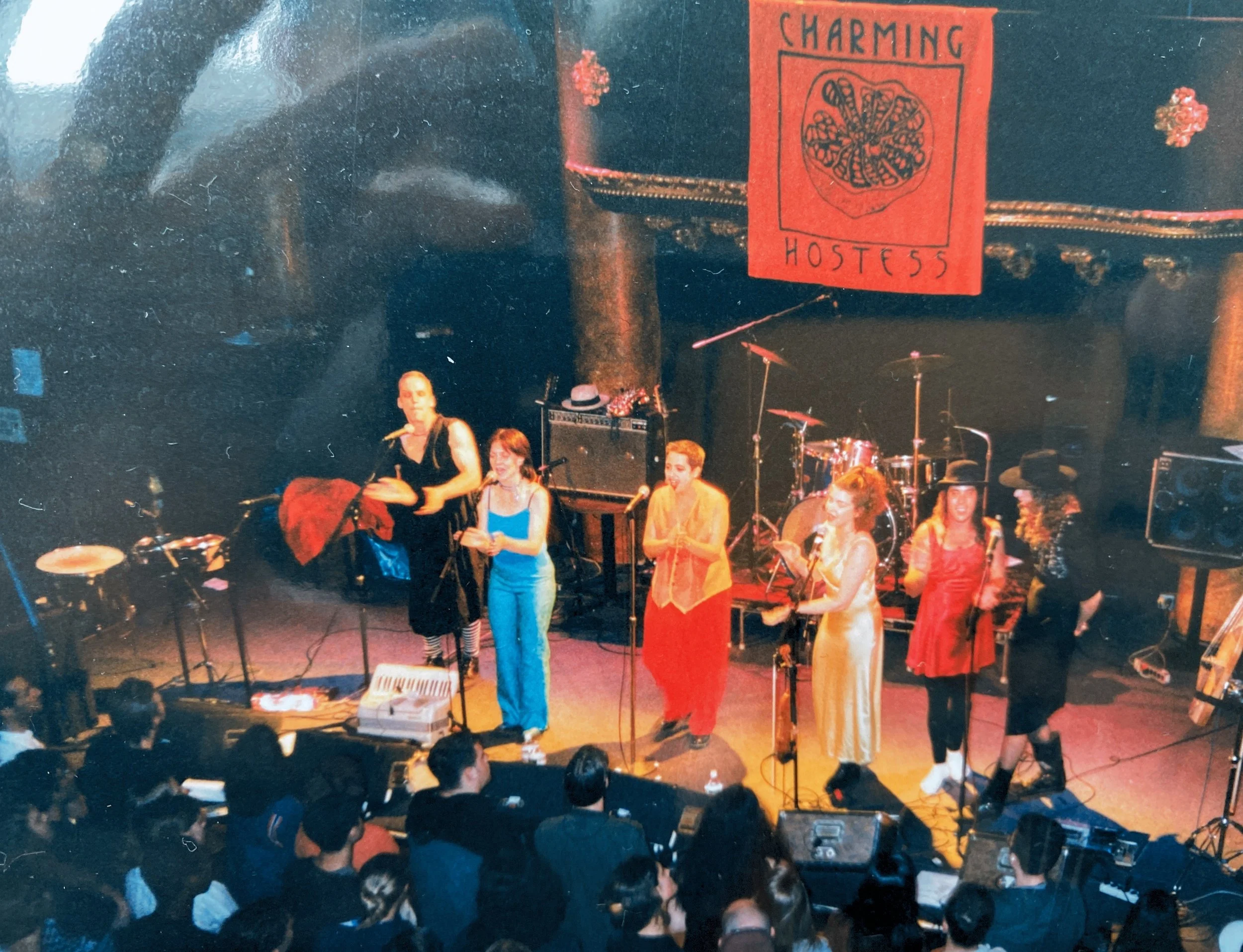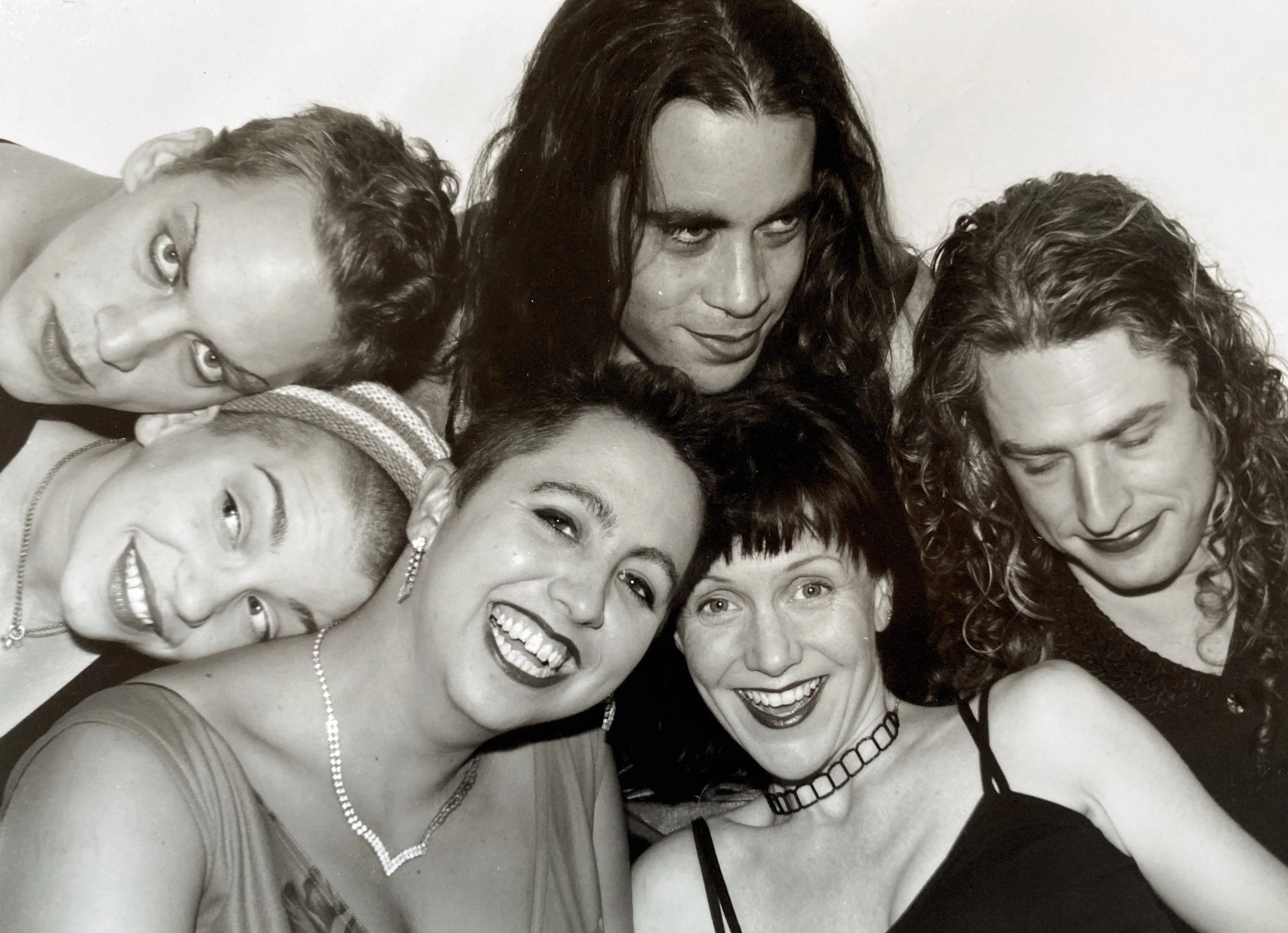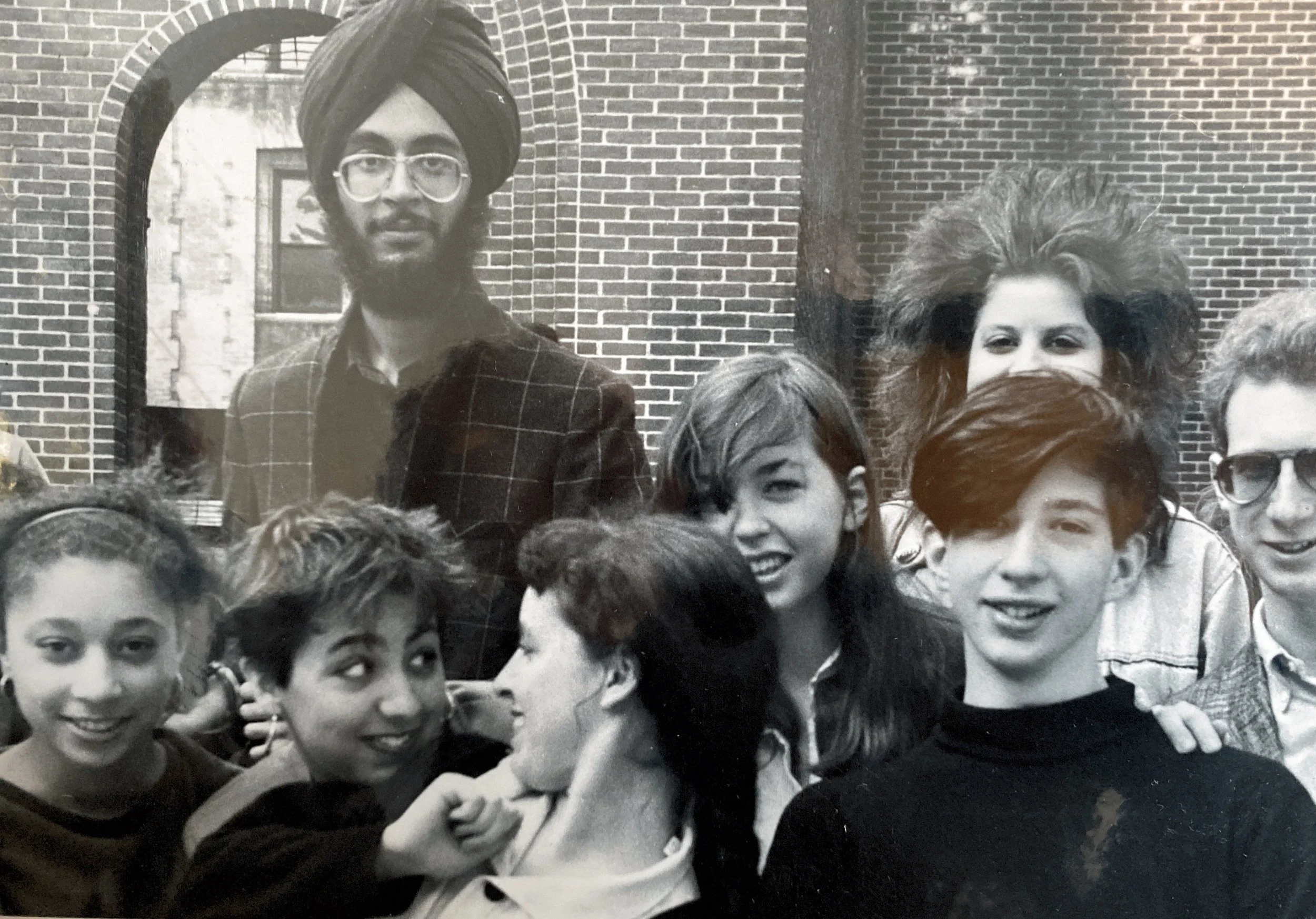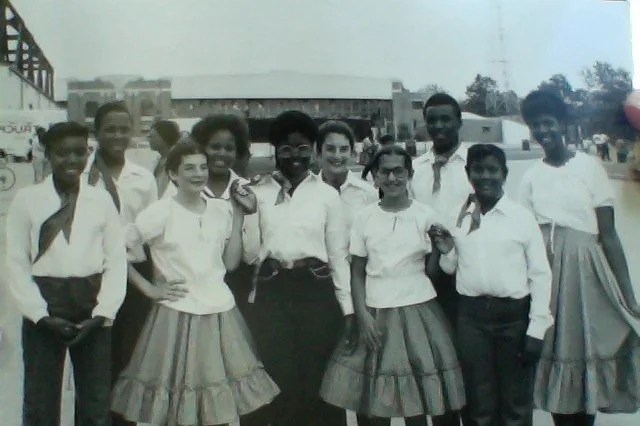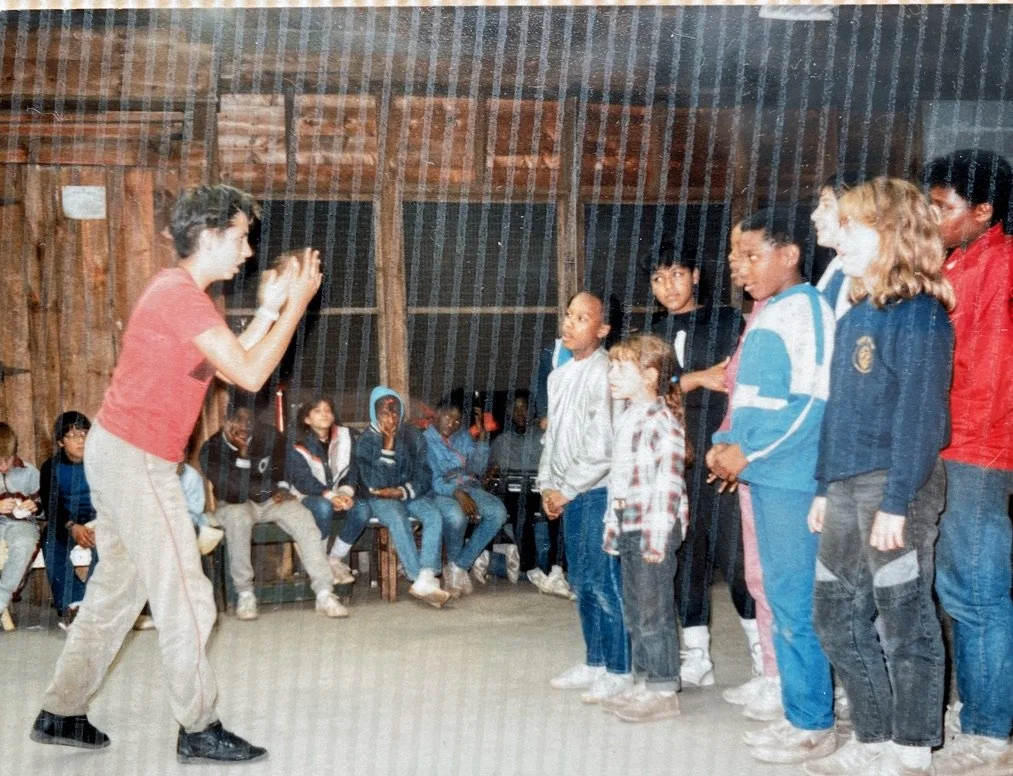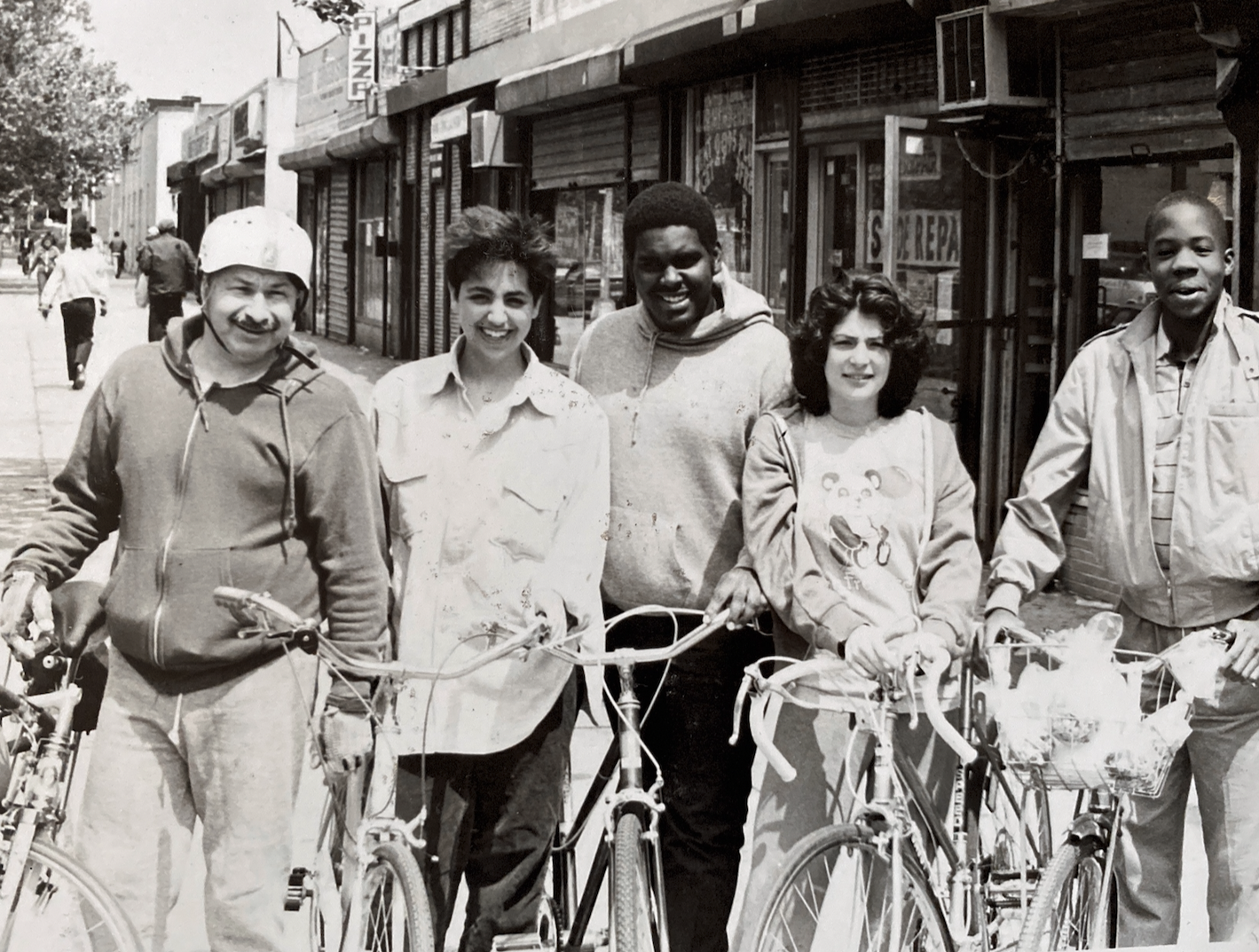THE DIG
Drop Down Into a Visual Timeline
May 20, 2022
Posthumous Release of "The Ginzburg Geography"
The Ginzburg Geography is based on the life and work of Italian anti-fascists Natalia and Leone Ginzburg, exploring their journeys of love, work, resistance, and exile. As with her other Charming Hostess endeavors, Jewlia Eisenberg plunged deeply into research and created songs inspired by their life, love and writings as well as songs from Italian regional traditions, Italian Jewish liturgy, and anti-fascist songs from work chants to resistance anthems. Jewlia laid down vocals and oversaw the recording of the majority of band tracks but was not able to finish. Since her passing, her longtime collaborators Marika Hughes and Max Baloian have completed the album consistent with Jewlia’s vision based on her notes and past performances.
Tzadik is deeply honored to present this historic and heartfelt final project by the endlessly creative force that was Jewlia Eisenberg.
Jewlia visiting Bolinas, CA just before her admit to UCSF for a bone-marrow transplant, December 2020.
December 2020 to March 11, 2021
3 months at UCSF during COVID, Died
Jewlia completed the work she could (see below) during the COVID summer of 2020, while under attack from debilitating infections and autoimmune inflammation. She took a final vacation and then checked-in for her bone-marrow transplant. During this sixth and final hospitalization, including two months in the ICU during a pandemic peak; Jewlia died surrounded by a small group of friends and family at UCSF.
Since her death, her collaborators and friends have worked to realize additional projects Jewlia had launched, including, continuing her CWF Grant to produce Fierce As Death, Queer as the Song of Songs. An October 2, 2022 performance is planned at the SF Contemporary Jewish Museum. A series of virtual gatherings were orchestrated by artist, Seth Eisen, featuring people as diverse as Jill Hammer, Victoria Hammer and Rabbi Amichai Lau-Lavie. The fabulous Jenny Romaine executed an IRL New York iteration that taught Queer Song of Songs on the sidewalk.
Joyful singing about the Ginzburgs in Nino’s Bird & Egg Studio, July 2020.
June - July 2020
Records & partially produces The Ginzburg Geography
During the height of the pandemic and with a severely compromised immune system, Jewlia pushes herself into the recording studio to finish the project she described as "the most important" to her before getting her bone marrow transplant. She does this in spite of a growing, deadly fungal infection in her head, nearly continuous fever/migraines and hospitalizations the month before (early June) and again in August, never recovering her full strength.
This presentation is a performance, an introduction to Dropkin’s work and milieu, and a discussion of open-archive process, where everything from research to brainstorming to listening to composition to rehearsal to presentation happens at a single site.
May 2020
University of Chicago WebShow
With live performance impossible due to COVID, Jewlia continued to perform Zoom gigs as her health allowed. Shows included this Univesity of Chicago show and home produced her own "Omer Bot" and Hannukah.
Celia Dropkin was a transgressive visionary who published her first poems in Yiddish around 100 years ago. She wrote about desire and violence in a way that feels shockingly true; her work is well-loved by musicians and queers. Book of J (Jewlia Eisenberg and Jeremiah Lockwood) were artists-in-residence at YIVO in 2018, setting Dropkin’s papers to music—including unpublished poems, autobiographical sketches and letters. This presentation is a performance, an introduction to Dropkin’s work and milieu, and a discussion of open-archive process, where everything from research to brainstorming to listening to composition to rehearsal to presentation happens at a single site.
April - August 2020
"Meet Us" Dance Score
Composes & records Dance scrore for Jo Krieter. Flyaway Productions and MoAD Present "Meet Us Quickly with Your Mercy". Dance Performed October 14-17, 2021.
Choreographer & Director: Jo Kreiter, in collaboration with the dancers Lead Collaborator: Rahsaan Thomas Dancers: Bianca Cabrera, Clarissa Dyas, Laura Elaine Ellis, Maddy Lawder, Megan Lowe, Sandia Sexton, Helen Wicks Composer: Jewlia Eisenberg, with Shahzad Ali Ismaily Set Designer: Sean Riley Lighting Designer: Jack Beuttler Costume Designer: Jamielyn Duggan Production Manager: Matt Leonard Technical Director: Acacia Houle Riggers: Dave Freitag and Andrew Castle Stage Manager: Alina Novotny
Jewlia and Jeremiah sing on 14 Moffit, UCSF Hospital, January 2020. Jewlia's trach hole in her throat is still open, so she needs to hold her hand on her throat to enable air to pass by her vocal cords.
November 2019 - February 2020
UCSF 45 days, 30 Day ICU Stay & induced Coma
Intense lung infection results in intubation, an induced coma for 30 days, and subsequent complete paralysis. The 45 Days at UCSF was followed by one month in a rehabilitation facility to learn how to walk again. She would refer to this hospitalization as “that time when they put me in a jar”.
Jeremiah and Jewlia perform "LA Archivera".
Photo by David T. Coons
2019
LA Archivera: The Sonic Archive of Emily Sene
Jewlia was selected for the initial cohort of the Archive Transformed fellowship at UC Boulder. She received an incubator grant to develop LA Archivera, an exploration of the work of Sephardi Los Angeleno folklorist Emily Senne. Working with Jeremiah Lockwood. LA Archivera is an exploration of the recordings of archivist Emily Sene, held in the UCLA Sephardic Archive, by scholar Jeremiah Lockwood and musician Jewlia Eisenberg.
From the 1940s to the 1970s, Emily Sene gathered music without institutional support or academic background. Her informants were from her family and community in Los Angeles, mostly Jewish immigrants from Turkey whose native tongue was Judeo-Spanish (also known as Ladino). Her collection is a revelation: It documents and illuminates the experience of Sephardic Jewish immigrants to California through music. Read more
Jewlia and Jeremiah perform Son House's "Yonder Comes My Mother," live at Relix.
2016 - 2020 Book of J
Jewlia Eisenberg and Jeremiah Lockwood are “Book Of J”.
WHAT IS BOOK OF J?
Book of J is engaged in new psalmody, drawing from the rich biblical commentary of Black and White American traditional music, Yiddish songs of ghosts and police violence, and piyutim (paraliturgical songs) with a queer bent. Expect old-time religion, radical politics, angels and demons, workers and bosses, diasporic languages, erotic longing, close-text reading, hard times resolved and destiny fulfilled. Also, singing along is good. Book of J is Jewlia Eisenberg (Charming Hostess) and Jeremiah Lockwood (Sway Machinery).
When starting the Book of J collaboration, Jewlia and Jeremiah quickly realized that, in addition to their passion for Jewish liturgical traditions, they had a shared repertoire of American folk religious music. Jewlia had encountered this body of song while being raised by Marxist wolves, where Black and white religious music had been repurposed as justice music. And Jeremiah knew the music from his connection to Blues musician Carolina Slim, who in his later years dedicated himself to playing gospel music to prepare himself for the journey to the next world. The same songs are equally at home in devotional and social change contexts. These jewels of American Psalmody are rooted in the prophetic voice, using old stories to comment on the present day, and to hold our own time to account.
Jewlia Eisenberg and Jeremiah Lockwood's "Book of J" collaboration blooms into archive project and performance.
2018 YIVO Institute for Jewish Research
"Bent Like A Question Mark", Celia Dropkin Project
Although Yiddish poet Celia Dropkin first published around 100 years ago, she wrote about desire and violence in a way that feels shockingly contemporary, and is currently receiving renewed interest from contemporary artists, musicians, as well as queer performers and theorists. Book of J (Jewlia Eisenberg and Jeremiah Lockwood) are artists-in-residence at YIVO in July working with Celia Dropkin’s archive, setting to music material they have uncovered at YIVO. This is an open-archive residency, where everything from research to brainstorming to listening to composing to rehearsing to sharing their work happens on site at YIVO. This work-in-progress concert presentation of the music was created during their residency.
2017
University of Chicago, Academic Residency
Jewlia's academic residencies include teaching seminars, workshops and master classes with college students.
David Shneer and Jewlia Eisenberg perform the classic revolutionary song “In Kamf (In Struggle),” written by Dovid Edelstadt.
2017
"Art Is My Weapon", The Radical Musical Life of Lin Jaldati
Jaldati was a key player in shaping Holocaust memory in East Germany, where Soviet-inspired cultural politics about war commemoration intersected with Germany’s role as the perpetrator of war crimes. Jaldati’s Yiddish music sits at that junction.
Based on his groundbreaking research in archives on three continents, historian David Shneer and musician Jewlia Eisenberg have transformed the story of Lin Jaldati into a new, 70-minute mixed media project currently traveling the globe in the footsteps of Jaldati’s own tours. More Information
Written, Designed and Directed by Seth Eisen.
2016
Homofile Theater
Homo File chronicles the life of iconoclast Samuel Steward (1909-1993). Steward was a college professor, a prolific author of homoerotic fiction, an influential tattoo artist, and Queer sexual rebel who lived his final three decades in the Bay Area before dying in his 80s, nearly forgotten.
Flyer for Jewlia’s Queeer Piyut, based on fabulous art of Jean-Michel Basquiat. Some of these projects were billed as “Radical Ritual”, some “Book of J”, with Jeremiah Lockwood, and some were simply “Jewlia Eisenberg” productions.
June 2016
Asylum Grant Support for Queer Piyut
Jewlia grew several projects from deep dives into religious texts. She spent time with medieval Hebrew and Arabic poetry that shared the the milieu. She visited synagogues to hear songs from North Africa, the Middle East and the Balkans. She studied with paytanim that taught women and learned about contrafacta in secular contexts. She studied oranments to learn how to improvise her own maqam for tunes in Berkely and Jerusalem. Then, she turned these experiences into Radical Ritual events accessible to all.
Queer Piyut.
Piyutim are mystical love songs to the divine, in elegant Hebrew. They represent a wide variety of sensual expression, with a recurrent fluidity of both poetic voice and object of desire. This ancient devotional form destabilizes gender and heterosexual normativity and in doing so, creates a surprisingly sweet space for diverse sexual expression in ancient liturgy. We sing these ancient songs in a way that their both their holy striving and their queer erotics can be felt. Plus the tunes are amazing: perfect for dance clubs and houses of worship.
Song of Songs.
This program is a fully interactive text study/ collaborative creative experience. The workshop begins on a deep reading of passages from the Song of Songs, delves into commentary and proceeds from their to a unique collaborative song writing experience that involves all participants as equal members in the creative process.
New Moon Gather.
This program is based on the cycle of the Jewish lunar calendar. It combines text study related to the month at hand, group dialogue and spirited music performance in a unique interactive and participatory experience.
Video that Jewlia shot of a display the NIH library during her 2016 hospital stay.
February 2016 - 8 day Hospitalization: Blood Mutation
Returns from Israel shows & NIH hospitalization
More fluid on lungs, with unknown infection. Temporary, auto-immune hearing loss. While at the NIH, Jewlia conducts interviews with the doctors and medical staff at the NIH in preparation for a project called, “Blood Mutation, a music performance about transcription and translation in blood cells and sacred texts” that she conceived in response to her own GATA-2 genetic mutation. As she wrote, “Blood Mutation is an immersive music performance which also incorporates non-coercive ritual, blood divination, and text study. It offers all the drama of stressful genetic testing but done in a communal setting with total agency over the outcome. . . and lots of girls singing!”
Yiddishkayt - This shul served about 6,800 Jews. An estimated 5000 people from this town were killed during the Nazi occupation 1941-1942.
August 2015 - Belarus
Bykhover Shul
Jewlia with Helix Fellows on Yiddishkayt Program, traveling throughout Belarus, Latvia, and Lithuania with a group of scholars, artists, writers, and students that included her longtime collaborator David Shneer z"l. She taught and lead the group in song, exploring the deep Ashkenazi cultural heritage related to these sites.
Jewlia and David Schneer, Louis P. Singer Endowed Chair in Jewish History and Professor of History and Jewish Studies.
2015
Franklin & Marshall College, Academic Residency
Jewlia Eisenberg and David Shneer teach “Art is My Weapon”.
In 1934, at 22 years of age and one year after Hitler came to power in Nazi Germany, Lin Jaldati, the stage name for Rebekka Brilleslijper, gave her first performance of Yiddish song and dance for the immigrant Jewish community of her native Amsterdam. In 1988, one year before the Berlin Wall fell, she gave her final concert in that city divided by the Cold War as part of East Germany’s new avant-garde festival, The Days of Yiddish Culture. Two parts passionate music, one part stunning images, one part inspiring story, Lin Jaldati: Art is My Weapon tells the life and work of this remarkable woman.
Charming Hostess @ Ethno Port Poznan Festival 2014
2014 Charming Hostess Tours
Enthno Port & More Tours
Charming Hostess plays Ethno Port and European tour. Jewlia wrote: “It's been a great summer for Charming Hostess, with shows in Poland, Germany and Italy. We sang, we drank, we learned. We got deeper into anti-fascist song, and started working with scholar David Shneer on the music of communist Jewish diva Lin Jaldati. We got to play with old friends like Ganda, Charles, and Yuriy.”
2013 Unpacking Mapping & Audience Engagement
University of Colorado Academic Residency, CounterPulse Residency, SF Arts Commission
In developing “The Ginzburg Geogrphaphy”, Jewlia workshops community cartography. We lead workshops in radical cartography, including oral, sonic, and visual forms that people can use for personal mapping or to map an issue that is coming up within a city. Described as radical cartography, this project is video and art installation that traces the life and work of Leone and Natalia Ginzburg. The Ginzburg Geography has as its foundation an interactive digital map of the family's experience of love, family, resistance, escape, liberation and redemption in occupied Europe during WWII.
The interactive component invites others to map their own journeys of love, resistance, exile, liberation, life and death.
Southern Exposure, San Francisco, CA on October 25, 2013. View the full version of another performance.
October 25, 2013
Score for Sonic Kung Fu
Mike Lai's Sonic Kung Fu. In Mike's words: "This project is a continuation of my investigation of cinematic and performative strategies in Kung Fu genre films. I intend to emphasize the importance of sound effects in filmic experience, while at the same time, noting how the experience is also fabricated. Charming Hostess works as a live chorus here, re-creating fight scenes from the genre by using their vocal cords and body percussion."
Jewlia Eisenberg and Charles Ferris in Naples
One-take live performace for harmonium and trumpet
Shot and edited by Martin Errichiello
Guerra di Popolo
Text by Leone Ginzburg, 1944
Credit: Yeleen Film
2012
Begins work on "The Ginzburg Geography"
The Ginzburg Geography is a musical map. That means I am looking to sonically represent information about the three places in Italy that the Ginzburg family lived together: Turin, Abruzzo, and Rome. The texts come from what the Ginzburgs wrote about each place. The musical palette is drawn from traditional sources from those specific three places including: work songs, prison ballads, WW2 partisan marches, and Jewish chants. Some of these sources are performed (somewhat) traditionally; for others, I “de-compose” them and take elements—the scale, a bassline, a rhythmic figure—to make a new song that draws on a traditional source.
The words, which are about Turin, Abruzzo and Rome, already provide sense of place. What the music does is open up the listener’s relationship to the place and the people, allowing some moments to feel universal and others very specific—outside one’s experience yet familiar. Because of the Ginzburgs’ connection to the culture and values of people who work the land, I wanted part of the music to echo the work chants and life cycle songs from Abruzzo. I wanted to honor Leone’s anti-fascist activism by being in conversation with partisan music. I wanted to capture the grit of Turin and the spirit of Rome with textures of urban popular music. I wanted to touch on how the fervor for justice can be like a religious calling, if your religion is freedom, and also acknowledge the Jewish heritage of the Ginzburgs, using threads of Jewish devotional music. In short, the music draws from regional, political, popular and religious elements. The music is the core map of the project.
Jewlia Eisenberg leads a song at the JeWitch Collective’s “Song of Songs Seder Celebrating Queer Sexuality” in the yurt at Urban Adamah in Berkeley, May 19, 2019. (Photo/David A.M. Wilensky). More Information
2006 - 2019
Lay Cantor and Jewish Ritual Facilitator
Jewlia spent over 15 years in the Bay Area singing Jewish music in sacred and secular spaces. She is currently works as a cantor both in the synagogue context at Aquarian Minyan, and independently at Radical Ritual. She has led inclusive Jewish ritual from Occupy Sukkot in the Oakland encampment to family-friendly Tu B’Shevat in the Redwood Regional park. She is part of the lifecycle of hundreds of Bay Area families, especially intersectional families—often multifaith, multi-racial, queer, trans, or just not comfortable in the institutional Jewish contexts they’ve found so far. In addition to her cantorial work, Jewlia regularly performed and taught Jewish Mediterranean vocal traditions at Jewish music festivals from Berkeley to Cracow, often with her ensemble Charming Hostess.Within the Jewish community, she is often called upon to bring people who feel outside, inside.
Her rich practice as a Jewish ritual facilitator of lifecycles is documented at Radical Ritual.
2012
Teraphim
Jewlia Eisenberg's installation, Teraphim, has transformed the third floor of Meridian Gallery into a place of multimedia installation, ritual, and music performance. Join us at Teraphim in a space rich with new artifacts, ancient text, film, idols, music, exploratory praxis (hepatoscopy, belomancy), interaction and contemplation.
Charming Hostess spin-off project: Gramaphone & Dynamo perform La Mar La Galana at Panda Theater, Berlin, October 2010. Jewlia Eisenberg, Jason Ditzian, and Jason Levis.
2011 Gramaphone and Dynamo
Cafe Aman
Gramophone and Dynamo interprets songs of the cafe aman with a focus on the intersection of rebetika and Salonikan Jewish music.
Known as “the Jerusalem of the Balkans,” Salonika (Thessaloniki) was for two millennia home to one of the largest and most vibrant Jewish communities in the world. The folk music of Salonika is spectacular—it sings of tragic history and bawdy drunks, gritty sex and highbrow romance. Rebetika music originated in the cafes, prisons, and hash dens of Constantinople and Smyrna. With the forced immigration of two million Greek-speaking refugees from Asia Minor in 1922, cafes aman in Greek port cities like Salonika became centers of rebetika.
The 1930s cafe aman was a meeting place for working people and underworld types. The musicians performing there were Greeks, Jews, Slavs, Turks, and, Vlachs. The culture of the cafe aman was anti-authoritarian and non-conformist: the music that came out of it synthesized Turkish scales, Balkan meters, Hebrew chant, and words in Greek, Turkish and Ladino. Gramophone and Dynamo is part of this hybrid tradition, drawing from both the violent, sexy rebetika music sung by Jewish women like Roza Eskenazi and Stella Haskil, and on the romantic and funny Sephardic folk music with its roots in Spain, North Africa and the Balkans.
November 2010 - 18 days
SF Kaiser ICU
Liver numbers became elevated to the point of liver failure. This required 18 days of hospitalization in November/December 2010 and included very low blood counts. A beloved doctor that Jewlia nicknamed “the necromancer” diagnosed her with cytophagic histiocytic panniculitis. At the time, he 80% certain of his diagnosis or a closely related auto-inflammatory disease. Time would prove that he was correct. The NIH would later diagnose the specific cause as a GATA-2 genetic disorder.
Credit: Charming Hostess
2010 September
Singing Praises
A centennial dance for the SF Women's Building, by Flyaway Productions, an apparatus-based dance company. Choreographer: Jo Kreiter Composer: Jewlia Eisenberg Band: Charming Hostess
Jewlia in her dome
Jewlia opens the Shabbat singing “Hallelu Avdey Adonai” at The Bowls Project..
2010: The Bowls Project
Installation
The Bowls Project is an interactive sound sculpture/immersive performance installation created by visionary composer Jewlia Eisenberg with her ensemble Charming Hostess. An ecstatic investigation into sex, magic and secret desires, The Bowls Project takes place within a stunning masterwork of ancient-meets-modern design: a double vaulted masonry dome by celebrated architect Michael Ramage, with video inscription by Shezad Dawood. The work is inspired by Babylonian Jewish women's amulets known as "demon bowls." It ran July 6-August 22 at Yerba Buena Center for the Arts in San Francisco.
The project design won the prestigious structural engineering award.
The programming included performances July 6- August 22, 2010 and interactive engagements for visitors.
The scholarship, composition, rehearsal, planning and fundraising took five years. The construction took one month. Professor Daniel Boyarin provided original translations of ancient Amaeric bowls for the project.
Architect Michael Ramage designed the dome and supervised its construction. It is made of autovlaved aerated concrete tiles reinforced by geotextile. The form of building is called timbrel vaulting or Catalan vaulting. It does not rely on gravity but on the adhesion of several layers of overlapping tiles that are woven together with fast-setting mortar. It is thinner and stronger than any other vault or dome. The Bowls Project was proud to work with and learn from the master masons of BAC Local 3.
The plinth was needed to satisfy the City's seismic safety requirements. It is a seismic isolation system that was designed by WorkSafe and Degenkolb Engineering. Thirty-five large ball bearings sit in special steel bowls, allowing the artwork to sway with any seismic activity. The text is from a demon bowl from Babylon, the area that is now Iraq. The bowl was inscribed between 300-600 CE. The language is Jewish Aramaic. The translation is:
Peace be on thee,
a city whose population is very numerous,
whom I have not created, and whom I love,
and whom I call the mighty of the earth.
Some have eyes but do not see,
Some have ears but do not hear,
Those shall give me a stone for silence.
Credit: Charming Hostess
2010 The Bowls Project Performances
Curating Ritual Performances for the Apocalyptic Intimate
Everyone in urban Babylon used these bowls, cross-pollinating between different religions, cultures, ages, genders and economic backgrounds. In the cosmopolitan and porous spirit of these bowls. Jewlia invited members of San Francisco’s ritual communities to share their traditions in The Bowls Project dome at YBCA by leading open rituals, ceremonials, and worship services that touches on any one of The Bowls Project themes of 1) The apocalyptic intimate—how the personal meets the spirit world; 2) Women’s voices—ancient and contemporary; and 3) Embodying sacred text—ritual and the word.
Performances ranged from butoh with Dohee Lee in (and on) the dome to medieval madrigals, Equis and Estamos Cuban hip-hop and Mexican/American experimental music to balancing rituals by the women of Kularts, Sisters of Perpetual Indulgence botanical celebration of labia and plants, Kismat-Mahal Kirtan Ecstatic devotional chants, Cornelius Boots and his gigantic flues, Body Music Fest, and so much more!
2010 The Bowls Project Installation
Secrets of the Apocalyptic Intimate
The Bowls Project CD was released simultaneously with The Bowls Project: Secrets of the Apocalyptic Intimate, at Yerba Buena Center for Arts in San Francisco, July 6-August 22. This interactive sound sculpture/immersive performance installation is an international collaboration created by Charming Hostess with videographer Shezad Dawood and architect Michael Ramage. An ecstatic investigation into sex, magic and secrets of the home, The Bowls Project took place within a stunning masterwork of ancient-meets-modern design: a towering double vaulted masonry dome by celebrated architect Michael Ramage. The dome was a place to share a secret and listen to the anonymous secrets of others, listen to live music on Thursdays, participate in ritual on Fridays, encounter embodied text on Sundays, and dig on the apocalyptic intimate.
2010 The Bowls Project - Album Release
The Bowls Project - Tzadik, Radical Jewish Culture
The Bowls Project sings of mysticism and magic, angels and demons, and the trials and joys of love and sex. It is based on inscriptions from ancient Babylonian Jewish amulets. Especially audible are the voices of Talmudic-era women: their work, hopes and dreams. Weaving together Babylonian devotional songs, apocalyptic American folk music and a radical take on ritual power, The Bowls Project marks the deepest and most creative work by Charming Hostess yet.
Jewlia Eisenberg: Vocals, Electronics Jason Ditzian: Clarinets, Flutes, Jaw Harp
2009
HEAVENSHOW
Jewlia composed and performed HEAVENSHOW for "The Alef-Bet Project" at the San Francisco. Contemporary Jewish Museum Music released on Porter Records 2014.
HEAVENSHOW was curated into the Contemporary Jewish Museum as part of the Alef-Bet Sound Project. Other musicians in the project included Laurie Anderson and Lou Reed. The piece was written to play in Daniel Libeskind's soaring sacred space, the Yud Room. HEAVENSHOW is based on the letter Hei, which represents divine breath. As the fifth letter of the Alef-Bet, it corresponds on a physical level to the five fingers, the five senses, and the five dimensions.. HEAVENSHOW explores breath as creation and revelation. The piece is full of breath, processed in many ways: through the body, through wind instruments, through electronics. More Information
Performing at Hornucopia in October 2008, just three weeks before her ICU stay.
November 4-9, 2008
5 days - SF Kaiser ICU
With worsening shortness of breath, Jewlia attends election night parties and the Castro’s street party celebrating the Obama victory and mourning the passage of Califronia’s gay marriage ban, Prop 8. She returns home to hear vociemail from doctor reading her imaging from earlier in the day. She will need to be admitted to ICU due to viral myocarditis and pericarditis that have collapsed her aorta, causing heart failure. She would be hospitalized again in between performances over the next three months, suffering from nearly continuous fevers, as was common in what she learned were called “autoimmune flares”. Jewlia appears to fully recover by March 2009.
The Art Bears at FIMAV: Chris Cutler, Fred Frith, Jewlia Eisenberg, Carla Kihlstedt, Zeena Parkins, Kristin Slipp and The Norman Conquest.
June 2008
Art Bears Songbook
An Art Bears "review" took place in May 2008 at the world premiere of the Art Bears Songbook at the 25th FIMAV in Victoriaville, Canada. Dagmar Krause was unavailable so Fred Frith and Chris Cutler brought together vocalists Jewlia Eisenberg, Kristin Slipp and Carla Kihlstedt. Jewlia arranged extensive harmonies and three-voice interaction between Eisenberg, Slipp and Kihlstedt. Eisenberg brough great idiosyncratic energy to the outre material from "The World As It Is Today".
According to All About Jazz "the combination of voices augmented by The Norman Conquest's astute sonic enhancements that gave these renditions new meaning and their own distinct validity. ...[The Art Bears Songbook was] "not just a highlight, but the highlight of the festival."
2008
Krakow Jewish Culture Festival, with "The Ark"
Krakow Jewish Culture Festival. Jewish Uranian songs arranged by Marjana Sadovska. Performed by The Ark. 2008. "The Ark"-- a Jewish Music Festival Artist Residency with Frank London, Aaron Alexander, Avi Avita, Stuart Brotman, Jewlia Eisenberg, Glenn Hartman, Jessica Ivry, Mariana Sadowska, and John Schott.
Russian media grapples with the ideas in Jewlia's performance on Russia Today
Summer 2007
The Bowls Mini-Tour
Tours Moscow's Bilingva, Tel-Aviv's Barby, Jerusalem's Yellow Submarine, NY's The Stone, SF's Hemlock, and a proto-dome at the Marin Headlands Center for the Arts.
Before and after: Radical Dentistry Project
2007 Bicycle Crash at Headlands
Radical Dentistry Project
As Jewlia described, "Yesterday I was riding home to SF from the Headlands where I am an Artist in Residency. I went through some glass, my front tire popped and I flew over the handlebars, landing face first. I now have 48 stitches in my face and left most of my teeth on the side of the road.
The dentist said: You don't look as bad as I expected!
I said: Wow, you've seen someone who looked worse than this? He said: Yeah. He jumped out of a plane, and his parachute didn't open.
I didn't find that super-comforting, but I do feel blessed that I didn't break my head, neck or spine. Yay, helmets! Yay, medical care! The docs say I will be up and running in a month, but it's smoothies, soup and percocet between now and then. There will be no Charming Hostess preview performances of The Bowls Project in May, because I can't move my mouth. But stay tuned for the dental benefit concert! Thanks to everone that has sent their kind thoughts, it makes a big difference--more than I can say."
Jewlia workshops “The Bowls Project” concepts, music and proto-installation during her headlands residency. Jason Ditzian on clarinet.
2007 Headlands Center for the Arts
“but wouldn't it be cool to integrate a visual element that echos the sonic space referred to? people under a giant upside-down bowl--it's just the beginning!”
"I’d like to do work focusing on Babylonian incantation bowls, common 1500 years ago in the area that is now Iraq and Iran. Incantation bowls were inscribed with the needs of the household and placed in the corner to trap malevolent spirits. These spiraled inscriptions give us information about the social world of the time, and especially the hidden voices of women—their work, hopes, dreams and desires. I want to set the bowl texts to open up a larger discussion: of how people understand power in daily life, of how people map ritual and place, and of how music mediates these issues. The bowls themselves evoke a certain sonic space—spirals, bowls, corners, inscription—suggesting a musical language of containment and expansion that I want to explore."
Cynthia Taylor, Jewlia, Ganda Suthivarakom on "Sarajevo Blues" tour in Sarajevo.
2006 - 2007
Sarajevo Jazz Festival & tour
Ganda Suthivarakom recalls: Seeing the place where "snipers, at least those aiming at Sniper Alley, shoot from the Jewish Cemetery," and seeing the Sarajevo Roses, street craters filled with red concrete, put the recent war into context for me. Jewlia being Jewlia, knew to explain to me that there was a relationship between the bowl shape of the city and the stuffed nature of many of the foods, food being my favorite way to relate to a place.
Charming Hostess featuring Cynthia Taylor, Jewlia, and Marika Hughes (left to right) on vocals, Tzadik, Radical Jewish Culture.
June - December 2006
Release of "Sarajevo Blues"
Sarajevo Blues: Following up on the enormous success of Trilectic, Jewlia Eisenberg's Charming Hostess gives us a remarkable program scored for voices, beatbox, and string trio. Juxtaposing music and text from the Jewish, African, and Bosnian Diasporas, Charming Hostess sings of genocide and nationalism, freedom under siege, the nature of evil, and resisting war by any means necessary--themes that Jews think about, maybe even obsess over. Incorporating Jewish, Balkan and Sufi musical influences, Jewlia's boldly original compositional voice weds the sexy, soulful sound of 60's girl groups to the ambition and scope of 21st century classical music. Sarajevo Blues is an exciting new release with some of the most creative women working in new music today.
Jewlia’s father, Martin Eisenberg, gives kisses at Beekman Hospital, NY, NY.
December 26, 2004 - January 10, 2005
NYC ICU
Jewlia's first indication of illness: flesh eating bacteria. Temporary paralysis, doctors suspect lupus. Doctors declared “you’re lucky to be alive” which seemed to become the constant refrain with each new doctor Jewlia met and after each hospitalization.
October 10, 2004
Married
Gay marriage wasn't yet legalized in California as Jewlia participated in what the papers called "municipal anarchy" by marrying AnMarie Rodgers on valentines day 2004. The state later annulled that marriage, no matter-- they married three more times until the laws settled. Jewlia's favorite wedding was the one pictured here, the ceremony with friends and family outside of the law.
March 2004
Holyland Hos
Jewlia's collaboration with Israeli musicians, spanning a decade of shows. An Israeli iteration of Charming Hostess, she called "Holyland Hos". Jewlia Eisenberg: bandleader, composer, arranger, bass & vocals; Maya Dunietz: vocals & accordion; Michal Oppenheim Landau: vocals
Yoni Silver: saxophone & bass clarinet; Ruslan Gross: clarinet; Gur Rotkop: trombone; Nadav Lazar: guitar; Adam Scheflan: bass; Guy Schechter: drums; Karni Postel: cello & vocals; Boris Martzinovsky: accordion; and Ido Azaria: guitar & production.
"Premiered at Cowell Theater, San Francisco, in January, 2004. Choreography by Jo Kreiter Music by Jewlia Eisenberg Set Design by David Fredrickson. Credit: Flyaway Productions, MAP Fund Award
2004
The Grim Arithmetic of Water
"The Grim Arithmetic of Water" is an evening length dance performance that responds to the urgencies of water-its scarcity, its depletion, its contamination, and our inescapable need for it. The piece will layer gesture, force, tenderness, and a vital physicality to communicate the impact of water's scarcity on the human body.
November 1, 2003
Release of "Thick"
Thick: the seedy underbelly of the Supremes! This CD by Charming Hostesses duo, Red Pocket, features Marika Hughes and Jewlia singing about sexuality and its discontents. Thick is filled with passion, catchy hooks and avant-garde lyricism. Red Pocket, Tzadik, Oracle Women’s Series.
Approx 2005. Full NYC show.
2003 - 2005
Trilectic & Thick Tours
Featuring Jewlia Eisenberg, Marika Hughes, Cynthia Taylor, and Ganda Suthivarikom and with drums by Eve Sicular. Songs from Charming Hostess's "Trilectic" and Red Pocket's "Thick".
2002
Starface
Jewlia wrote, produced and directed a short-film with high school actors based upon an Isaac Babel screenplay. "Wandering Stars" was a Yiddish short story written by Scholem Aleichem, later turned into a script by Isaac Babel in the 1920's. Jewlia re-imagined the story as a dystopian vision of Oakland. "Starface" is a silent film with an excellent soundtrack culled from radical Jewish sources (no way! yes, it's true!). This is the story of love lost and found, talent nurtured and talent squandered, and the conviction to start a revolution. There is communist propoganda, yiddish butoh and even some dadaist/constructivist special effects. It is sure to amuse.
Album by Jewlia aka "Charming Hostess" released on Tzadik, Radical Jewish Culture.
2002
Trilectic
Trilectic: The heart of Jewlia/ChoHo's 2002 release, “Trilectic,” is a song cycle for female voices exploring the tumultuous relationship of two radicals: Walter Benjamin (critic/philosopher of aesthetics, language and history) and Asja Lacis (Bolshevik firebrand and queen of agitprop). These two had an intense connection, both political and erotic. They talk about whether Benjamin should join the Communist party, what’s wrong with Zionism, and how the masses are controlled by spectacle. But they also discuss their sensual world---for instance, what it’s like to lie in bed with a lover, just kissing and touching. The music is both sexy and cerebral, as suits these lefty nerds in love. Released on Tzadik's Radical Jewish Culture Series.
Charming Hostess, Recommended Records. “Punch”, recorded prior to “Trilectic”, in the late 1990s-early 2000s, released in 2005.
2001 Charming Hostess Big Band
Punch
Punch: The Hostesses here are an extraordinary 7 piece band: tight, a little rockish, comprising bass, drums, guitar, fiddle, various horns, accordion and other occasional instruments (singing saw, for instance) - but the work is distinguished by the amazing vocal arrangements (everyone sings, and exceptionally). Full of additive rhythms stretched harmonies and pinpoint playing, this is evolved material, executed with great skill - and great looseness. Some traditional pieces from Bulgaria, Palestine, Transylvania and Southern America appear in very personalized arrangements alongside original songs that lean on zydeco and traditional American folk music.
2002
Radical Film Series, Red Rosa
Two musicians avoid rubber bullets at an anti-war demonstration and ask questions. Why does the left always eat itself? Will revolution come to our shores? Why do we feel alienated and crabby at a perfectly good demonstration? To build community and have a good time, we decide to make a traveling movie house for the red and the black. This is a meeting place for the new left and the whatís left, anarcho-syndicalists and leafy Greens, social democrats and democratic socialists. Guaranteed a popcorn- and politics-filled good time for all.
2000
Benefit Albums
Jewlia/Charming Hostess is featured on benefit albums for Revolutionary Women of Afghanistan, Doctors Without Borders, Anarchists Against the Wall, Hilltop Stop, Antifascist Anthems, and Women at the Wall.
2000 - 2020
Jewish Text and Sung Liturgy Learning
Her strong training in Jewish text exploration and sung liturgy began at Pardes (a modern orthodox Yeshiva in Jerusalem), and continued at Svara (an queer yeshiva in Chicago) and Bina (a secular social justice yeshiva in Tel Aviv). In addition she has had been lucky enough to study privately. Her teachers include R. Khaim Levy, master of the Andalusian Judeo-Arab classical music known as al-ala; and Khezi Tokio and Yair Dalal, stewards of the devotional chants of Jewish Babylon known as piyyutim. She has been presented by and received support for her work from Jewish communal organizations locally (the Jewish Music Festival, the Jewish Community Library, the JFCS Holocaust Center) nationally (the National Foundation for Jewish Culture, Six Points Foundation, Reboot) and internationally (La Musée d’Art et d’Histoire du Judaïsme in Paris , Eshkol in Moscow, The Abraham Foundation in Ramallah/ Jerusalem). She works with Grammy-winning Jewish musicians such Frank London and Avi Avital. She has released four CDs as part of the Radical Jewish Culture series on the Tzadik label, curated by MacArthur winner John Zorn. There is no question that Jewlia’s longstanding work as a cantor and as a traditional Jewish musician is authentically rooted in and recognized by her community.
Jewlia grew up hearing Sephardic music from her mother’s family, Sephardic Egyptians who kept their cultural ties to Spain. But don’t imagine some kind of pristine “traditional” environment for cultural transmission because Jewlia was raised in a complicated commune in Brooklyn by hardline Marxists. Her parents—all of them—were militant and intense. But they taught of learning traditions holistically—that songs have ancient sources, that they evolve, and that the conditions of their evolution are valuable knowledge.
Jewlia bit on that idea hook, line and sinker, and went to UC Berkeley to get degrees in History and Music. Afterwards, she thought she would continue her studies and be an ethnomusicologist. She did funded fieldwork in Jewish communities in Bulgaria, Turkey, Israel, Egypt, Tunisia and Ethiopia. In most of her fieldwork she documented Jewish women’s vocal traditions, contrasting Northeastern and Southeastern Mediterranean repertoires. On these trips, Jewlia had her first exposure to Jewish religious music. She decided not to be an ethnomusicologist, but instead to be a cantor and musician, taking part in a living tradition. In the past, women have kept the lifecycle songs while men kept the religious ones. Jewlia worked in both sacred and secular forms, which is no longer unusual.
1998
Eat
EAT: A hoedown where bodacious babes belt the blues in Bulgarian while a punk-klezmer band rocks out in accompaniment.
Charming Hostess Big Band was: Jewlia Eisenberg (voice, direction), Carla Kihlstedt (voice, fiddle), Nina Rolle (voice, accordion), Wes Anderson (drums), Nils Frykdahl (guitar, flute, saxophone, percussion), and Dan Rathbun (bass). Eat was released on Vaccination Records in 1998.
Members of Jewlia’s ensemble Charming Hostess were visiting artists at Berkeley High and at Longfellow Middle School in 2008, in band class and in chorus. They taught Jewish music (repertory and improvised) from Salonika, Ethiopia, Iraq and Ukraine.
Radical Yids, some of Jewlia’s first projects rooted in scholarship and fun for teens; funded Goldman Fund, Tikea Fellow
Early 2000 - 2019
Teaching Radical Jewish Culture
Jewlia has held Academic Residencies at MIT, UCLA, Cornell, Williams, University of Chicago, University of Colorado, Denver and CalArts. This involves teaching seminars, workshops and master classes with college students, community members, and the youth outreach programs associated with the universities. She has taught classes on radical Jewish culture, on Walter Benjamin, on Lillith texts, on Babylonian amulets, on music and poetics, and on Jewgirl icons. She has led workshops on diaspora vocal practice and setting sacred texts at UMass, Smith, Hampshire and NYU. She has also led reading groups and Rosh Khodesh groups around the Bay Area.
Youth: Developed a unique curriculum that foregrounded Radical Jewish Culture and creative projects as the central modalities of her pedagogy. (Bay Area Midrasha & others) One Project “J-Train” taught high school students about radical Jewish culture and documentary filmaking, who then traveled with her to NY. As her flier described: “Live your dreams, learn some skills, root into your history! Explore New York with other Jewish teens on the J Train !”
What’s it all about?
Discover Yiddish pioneers in your field of interest, from poets to actors, politicians to anarchists
Connect with people in New York pioneering in those fields today
Explore radical Jewish culture in New York, past and present
Learn documentary arts skills and make a short film about your journey
A Biography of Lilith by Lynne Sachs. 16mm, Women Make Movies, NY, NY, 1997.
1997 A Biography of Lilith
Soundtrack
"A Biography of Lilith" opens with the story of Lilith, the first woman, for some the first feminist, who left Eden vowing vengeance for Adam's treatment of her. In Lynne Sach's beautiful meditation, a modern Lilith muses on the choices she has made, while intertitles chronicle historical superstitions regarding Lilith's power, and songs and compositions by Charming Hostess help give her voice."
1994 - 2000
Charming Hostess Big Band
Touring as the rock band that blended eerie harmonies, complex rhythms, and a playfulness about gender. Charming Hostess drew on women's vocal traditions (primarily from Eastern Europe and North Africa), and integrated them with American folk forms both white and black. Charming Hostess Big Band was: Jewlia Eisenberg (voice, direction), Carla Kihlstedt (voice, fiddle), Nina Rolle (voice, accordion), Wes Anderson (drums), Nils Frykdahl (guitar, flute, saxophone, percussion), and Dan Rathbun (bass).
1993
Charming Hostess Begins
Charming Hostess was founded in the fertile anarchy of Barrington Co-op, and nurtured by the West Oakland arts community, along with other coeval bands such as Fibulator and Eskimo. Half of Charming Hostess was also in Idiot Flesh/Sleepytime Gorilla Museum. The final effect was of a hoedown where bodacious babes belted the blues in Bugarian while a punk-klezmer band rocked out in accompaniment. The genre of this incarnation of ChoHo was KLEZMER-PUNK/BALKAN-FUNK. Recordings of Charming Hostess Big Band include "Eat" and "Punch".
1990-91, 1994-5, 1998, 2001
Field Recordings
Considering ethnomusicology, she spent a harvest season in rural Bulgaria, picking peppers and recording field songs. Finally, a pepper picker told her that the real “people’s music” was Stevie Wonder (she needed a Bulgarian to tell her that)! She decided against ethnomusicology and went back to Oakland to found Charming Hostess at the intersection of voice, text and diaspora consciousness. Her mission is to make lovely noise about complex ideas.
Field Recordngs
A: Jewish Bulgaria, Romaia, Hungary
B: Jewish Uzbekistan, Tajikistan, and Kyrghizistan
C: Jewish Greece and Turkey
D: Jewish Italy, Morocco, Tunisia, Ethiopia
Awarded a Weisz Fellow for field research & rcording among Jewish women in Ethiopia.
Jewlia on the front of the UCB paper, being arrested. Do not go gently into that dark night.
March 5, 1990
Barrington Squat, Police Clash and Arrest
The NY Times reported on the Squat that after the UC Student Coop voted to close Barrington Hall, 166 students were served with evictions and about 40 students choose to stay saying, “the people who are contesting the eviction have a right to remain in the building until the legal process is complete.”
Unfortunately, the Police and the neighbors disagreed. As the student newspaper reported, a late night poetry reading and musical performance gave the police auspices to start a clash of “blood and blazes” that lasted until 3am.
After the squat was busted and in the aftermath of a suspicious of death a fellow student during a confrontation with police on the roof, Jewlia left UCB for a series of field recordings as she explored a career as an ethnomusicologist.
Jewlia sings in Barrington.
1988 - 1995
Berkeley, CA - pre eviction
Jewlia attends UCB and lived in an anarchist hive, embracing skills both practical (carpentry, abortions and cooking for the masses), and critical (how to analyze texts by Foucault and scores by Stravinsky). At this time she was hooked by the scholarship that always found a home in her work.
Hunter High School kids doing Hunter.
May 5th, 1988
Hunter High School
In sixth grade, Jewlia tested into Hunter College High School in Manhattan, where she sang in the madrigal chorus, led trips to abortion rights protests in Washington, D.C., and challenged peers and teachers with her leftist ideas, keen intellect, and pugnacious pleasure in argument.
NYC youth from the Center Clogging at the state fair.
1982-ish
NYC Youth from the Center
Jewlia's father, Martin, was co-director of United Community Centers, aka “The Center”. Jewlia was raised by a pod of UCC adults in families that were Jewish and Black. They knocked on doors to raise funds in Starret City and performed clogging at the NY State Fair.
UCC remains a social justice driven community center serving the East New York neighborhood of Brooklyn.
Jewlia teaching songs at the UCC summer camp in upstate New York.
UCC Bike Ride
Credit: Martin Eisenberg
1973 - 1983
Early life in Starrett City, Unitied Community Centers
Jewlia grew up in a Black and Jewish commune in East New York, Brooklyn. Living with organizers, she was expected to “teach and preach” from picket lines to union meetings. As hip-hop emerged in ENY she absorbed the value of making music from personal news, using the body.
Credit: Anne Eisenberg
July 29, 1970
HELLO
Jewlia is born to Anne and Martin Eisenberg. Jewlia’s mother, Anne, left the pod early on. Anne, a technical writing professor and a science writer for the New York Times, taught Jewlia to speed-read before kindergarten and took her to museums and opera at an age when most children couldn’t sit still.
Looking for a narrative? Bounce to “Mapping the Journey” (10-min read)
Back to Top
